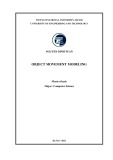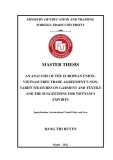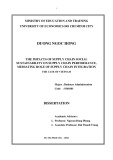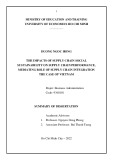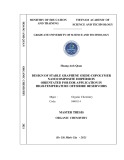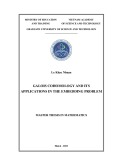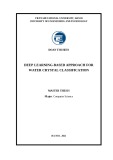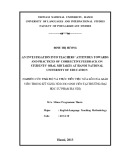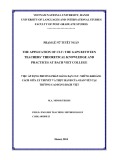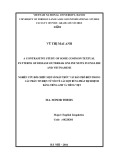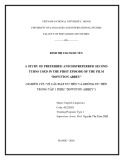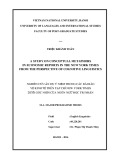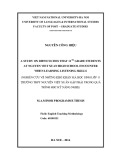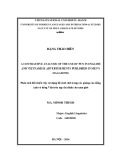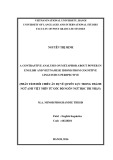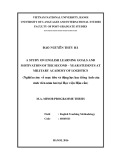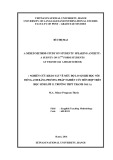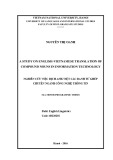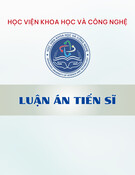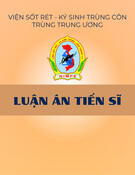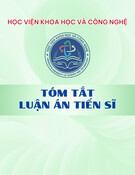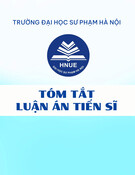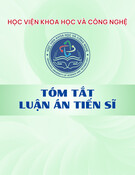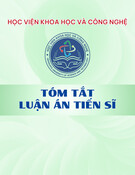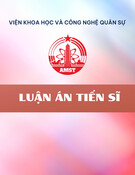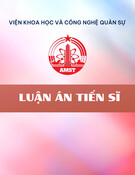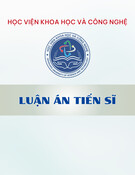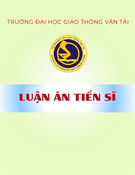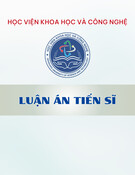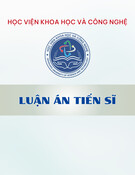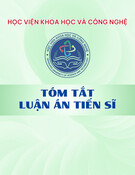VIETNAM NATIONAL UNIVERSITY, HANOI
UNIVERSITY OF LANGUAGES AND INTERNATIONAL STUDIES
FACULTY OF POST-GRADUATE STUDIES
LÊ THỊ THUÝ AN
EUPHEMISM OF DEATH AND SEX IN ENGLISH AND VIETNAMESE
POEMS FROM CULTURAL PERSPECTIVE
(Uyển ngữ về cái chết và tình dục trong thơ tiếng Anh và tiếng Việt
nhìn từ góc độ văn hoá)
MINOR MASTER THESIS
Major: English Linguistics
Code: 8220201.01
HANOI - 2019
VIETNAM NATIONAL UNIVERSITY, HANOI
UNIVERSITY OF LANGUAGES AND INTERNATIONAL STUDIES
FACULTY OF POST-GRADUATE STUDIES
LÊ THỊ THUÝ AN
EUPHEMISM OF DEATH AND SEX IN ENGLISH AND VIETNAMESE
POEMS FROM CULTURAL PERSPECTIVE
(Uyển ngữ về cái chết và tình dục trong thơ tiếng Anh và tiếng Việt
nhìn từ góc độ văn hoá)
MINOR MASTER THESIS
Major: English Linguistics
Code: 8220201.01
Supervisor: Dr. Huỳnh Anh Tuấn
HANOI - 2019
DECLARATION OF AUTHORSHIP
I, Le Thi Thuy An, hereby state that, this minor thesis is the result of my own
research and all the materials in this study which is not my own work has been
identified and acknowledged. I also state that the substance of the thesis has not,
wholly or in part, been submitted for any degree to any other universities or
institutions.
Supervisor MA. student
Dr. Huỳnh Anh Tuấn Lê Thị Thuý An
i
ACKNOWLEDGEMENTS
This research has been accomplished with the support and encouragement of
many people. Hence, I hereby would like to express my appreciation to all of them.
In the first place, I would like to express my deepest thanks to my supervisor,
Dr. Huỳnh Anh Tuấn, for his valuable assistance and guidance throughout my
research.
Also, I am greatly indebted to all the professors and staff of the Faculty of Post
- Graduate Studies for their meaningful lessons and precious support thanks to which
I was able to overcome obstacles during the time my research was carried out.
Last but not least, I owe a great debt of gratitude to my beloved family
whose support and encouragement have always been a great deal of motivation that
has helped me to overcome all problems to complete my thesis.
ii
ABSTRACT
Euphemism is a linguistic device to express emotions, ideas and transmit
attitudes in a more neutral way. Besides, euphemism, as a universal phenomenon, is
culturally specific. This study aims at investigating the use of euphemisms of death
and sex in English and Vietnamese poems. Specifically, the study seeks to explore
how death and sex euphemisms are used in poems and identify the similarities and
differences in their use from a cultural perspective. The research employed the
descriptive and contrastive method in analyzing the data and adopted a qualitative
approach. The data analysis demonstrates that both English and Vietnamese
euphemism is employed as face-keeping and taboo-avoiding function. However, in
English death is more perceived as relief, peace, a sleep, a reunion or an end while
in Vietnamese, death is perceived as a heroic loss or a natural force. Sex in English
is often perceived as a war and function. Whereas, in Vietnamese, sex is often
conceptualized as nature and companionship.
Keywords: euphemism, dysphemism, poems, cultural perspective
iii
TABLE OF CONTENTS
DECLARATION OF AUTHORSHIP .................................................................... i
ACKNOWLEDGEMENTS ..................................................................................... ii
ABSTRACT ............................................................................................................. iii
TABLE OF CONTENTS ........................................................................................ iv
LIST OF TABLES .................................................................................................. vi
Chapter 1 INTRODUCTION...................................................................................1
1.1. Rationales ............................................................................................................1
1.2. The aim and objectives of the study .................................................................2
1.3. Research questions .............................................................................................2
1.4. The significance of the research ........................................................................2
1.5. The research method..........................................................................................3
1.6. The structure of the study .................................................................................3
Chapter 2 LITERATURE REVIEW ......................................................................5
2.1. Euphemism .........................................................................................................5
2.2. Euphemism formation .......................................................................................6
2.3. Features of euphemism across cultures ...........................................................9
2.4. Sex and death euphemisms in review .............................................................11
2.4.1. Death euphemisms in English and Vietnamese ..............................................11
2.4.2. Sex euphemisms in English and Vietnamese ..................................................15
2.4.3. Sex and death euphemisms from a cultural perspective .................................17
Chapter 3 METHODOLOGY ...............................................................................22
3.1. Ressearch questions .........................................................................................22
3.2. Research approach and method .....................................................................22
3.3. The data .............................................................................................................23
3.4. Data collection procedure ................................................................................23
3.5. Data analysis procedure ..................................................................................23
3.6. Analytical framework ......................................................................................24
iv
Chapter 4 FINDINGS AND DISCUSSION ..........................................................26
4.1. Findings .............................................................................................................26
4.1.1 Death euphemisms used in English and Vietnamese poems ...........................26
4.1.2 Sex euphemisms used in English and Vietnamese poems ...............................33
4.2. Discussion ..........................................................................................................42
4.2.1. Death euphemisms used in Engish and Vietnamese poems ...........................45
4.2.2. Sex euphemisms used in English and Vietnamese poems ..............................47
Chapter 5 CONCLUSION .....................................................................................51
5.1. Summary ...........................................................................................................51
5.2. Implications ......................................................................................................52
5.3. Limitations and further research ...................................................................53
REFERENCES ........................................................................................................54
APPENDICES ........................................................................................................... I
v
LIST OF TABLES
Table 1: How death and sex euphemisms are used in English and Vietnamese poems ............................................................................................................. 24
Table 2: Similarities in the use of death and sex euphemisms in English and Vietnamese poems ......................................................................................... 25
Table 3: Differences in the use of death and sex euphemisms in English and Vietnamese poems ......................................................................................... 25
Table 4: Death euphemisms used in English and Vietnamese poems ................. 32
Table 5: Sex euphemisms used in English and Vietnamese poems..................... 42
Table 6: Euphemisms of sex as a companionship................................................ 48
vi
Chapter 1
INTRODUCTION
1.1. Rationales
Euphemism is a common linguistic phenomenon in all languages. Eversince
the beginning of the world, people have tried to make themselves understood and to
understand others to communicate; they have used all forms of communication, and
in time words or written signs as well as spoken forms have become more and more
specialized and complete.
Words, along with human evolution and development, have been endowed
with power, ideology and social change. This is what has been called the social
construction of reality. Therefore, words interpret the whole of our experience and
carry an entire upload of cultural and social-bound significance. Hai-long (2008, p.
55) went on to say that language and culture are inseparable from each other. As an
inalienable part of language, euphemism bears the mark of culture. He continues
that it can be easily tracked in our conversation and they reflect different levels of
culture and various patterns of culture. To some extent, euphemism is a mirror of
culture.
It is in that sense that euphemism, a special kind of words, as a medium of
communication, is chosen to investigate in the light of cultural perspective in
English and Vietnamese poems.
In so far, we have discussed that language demonstrates culture and the use
of euphemism is different from culture to culture. Therefore, cultural differences
may lead to communication breakdown (Daim et al., 2012), and there exists a need
to study euphemism in cultural contrastive analysis of English and Vietnamese
poems.
For years, study of euphemism in English and Vietnamese poems has been
neglected, meanwhile, euphemism is not only a social phenomenon, but also a
lingual phenomenon (Pan, 2013, p. 1). Studying English euphemism in comparison
1
with Vietnamese one may bring to light the similarities and differences in the two
languages and cultures, which seeks to help EFL learners understand and have
better use of English. This may also help EFL learners to have confidence in cross-
cultural communication.
What is more, in Vietnam, there has been a neglect of research into the
politeness strategies in cross-cultural communication in English and Vietnamese.
This present study seeks to propose some suggestions on using euphemism to
prevent communication breakdown. As an English teacher, the author would love to
contribute to the understanding of euphemism, thus promote smooth
communication based on cultural contrastive analysis of English and Vietnamese
poems.
In conclusion, the study attempts to investigate the euphemistic forms of
English and Vietnamese poems from a contrastive analytical perspective, from the
perspectives of various scholars working on euphemism and its elements and issues.
1.2. The aim and objectives of the study
This study aims at investigating the use of euphemisms of death and sex in
English and Vietnamese poems. Specifically, the study seeks to explore how death
and sex euphemisms are used in the poems and identify the similarities and
differences in their use from a cultural perspective.
1.3. Research questions
This present study seeks to answer the following research questions (RQ):
1. How are euphemisms of death and sex used in English and Vietnamese
poems?
2. What are the similarities and differences in the use of euphemisms of
death and sex in English and Vietnamese poems from a cultural perspective?
1.4. The significance of the research
In so doing, this study contributes important insights into cross-cultural
communication both in sociolinguistic and socio-cultural aspects of the use of
euphemism. This also hopes to enhance cross-cultural motivation, including
2
politeness strategies, cultural values and conventional awareness and harmonious
communication.
No research is able to represent precisely and accurately all the features of
the entire target population (Charles, 1998). This research is no exception and it is
limited to the analysis of euphemistic expressions on two topics: death and sex. It is
because human interaction in any type of situation usually avoids anything
unpleasant or embrassing. Euphemism has, therefore, flourished across multiple
themes and topics, which causes difficulties in choosing more topics for analysis in
the scope of a minor thesis.
1.5. The research method
This study employs a qualitative approach, which involves collecting,
analyzing and interpreting qualitative data in a single study. This employment is
adopted because qualitative data may provide a deep examination of a phenomenon
of interest and the results can be described in relationships among variables,
meanwhile, contrastive description of the data is needed to give a clear picture of
the data in the results of the comparative analysis.
The data are twenty poems from the two websites poets.org and thivien.net
with the following data collection criteria: (1) the article must have at least one case
of euphemism; (2) the articles belong to two topics, namely death and sex.
1.6. The structure of the study
This present study begins with a brief introduction of euphemism and
euphemism in relation of cultural perspective. The research problems are justified to
set aims and objectives of the study. The research gaps in the local context are
highlighted to explain the significance of the study. A focus on the research
questions is explained thoroughly in connection with the scope of the study to
narrow down the research problems and prove the feasibility of the study. Last but
not least, a list of guidelines for the method of the study is proposed to guide
through the study.
3
In chapter 1, the author reviews the extant literature and research that
motivates, generates and locates the research gaps, and furthermore, sets up the
background for the entire study.
Chapter 2 depicts the social background of Vietnamese and English cultures
on euphemistic expressions and methodological approaches adopted in this study. It
also reviews the previous studies.
Chapter 3 presents the research questions, the data and the research method
employed. The analytical framework is also discussed.
In Chapter 4, key findings and discussion are presented. A detailed account
and interpretation of the findings is presented in reference to research questions and
in relation to previous relevant research findings, which makes the findings of this
study reliable and valid.
At the end of this present study, conclusion should summarize the study
findings; focus on theoretical and practical implications as well as the limitations of
the study. This thesis presents a critical examination of the core features of
euphemism and dysphemism and their cultural differences in English and
Vietnamese.
4
Chapter 2
LITERATURE REVIEW
The literature review is essential for any research due to the fact that its
function is to explore the background knowledge from existing information in the
field of the research question, to explore previous findings and to view the
interpretation of the findings (Charles, 1998). To acquire an understanding of the
general concept of euphemism, it is important to analyze the way people perceive
euphemism in section 2.1 before considering how euphemism is psychologically
created in section 2.2. Section 2.3 presents the features of euphemism of death and
sex in English and Vietnamese poems in details and analyzes the relationships
between euphemism and culture. Section 2.4 reviews previous findings on the
topics of euphemisms of death and sex.
2.1. Euphemism
First and foremost, euphemism, judging by its etymology, dates back from
the 1650s, from Greek ―euphemismos‖, which refers to the ―use of a favorable word
in place of an inauspicious one‖; from its prefix eu-, which means ―good, well‖ and
the affix -pheme means ―speak‖. There was a time in Greece when folks tried to
avoid the usage of ill-omen (bad words) or names of Gods in public ceremonies
(Etymonline, 2018). For example, the Athenians called the prison ―the chamber‖,
and the executioner ―the public man‖.
Merriam-Webster Online Dictionary defines euphemism in this way: "the
substitution of an agreeable or inoffensive expression for one that may offend or
suggest something unpleasant; also: the expression so substituted." Leech (1981, p.
45) defines euphemism as "the practice of referring to something offensive or
delicate in terms that make it sound more pleasant." Sanderson (1999, p. 259) also
states that euphemism "can be used as a way of being vague and unclear, or to cover
up the truth or reality of a situation." At the same time, Johnstone (2018, p. 59)
phrases that euphemism is "the use of a supposedly less objectionable variant for a
word with negative connotations."
5
Noticeably, there is another entity called dysphemism, the opposite term of
euphemism, which may not often appear in our daily language use (Burridge,
2004). Dysphemism is an entity ―with connotations that are offensive either about
the denotatum or to the audience, or both, and it is substituted for a neutral or
euphemistic expression for just that reason‖ (Allan & Burridge, 1991, p. 26). A
dysphemism is generally used to offend someone deliberately. For example, the
sentence ―My boss is something else‖ may not carry a swear or an offensive idea
but it is something of negativity.
There are words and topics which are not usually supposed to be spoken of
directly in different cultures. It is here to say then euphemism is employed to
encompass the sensitive subjects such as religion, politics, sex, death, human body
and diseases. It is in this sense we see that the origin of euphemism has its own
social foundation. When communicating with each other, people not only have to
think of where they are, what to talk about, but also how to express their ideas. It is
when they may need to express what they want to say indirectly or to choose a
roundabout way to avoid any embarrassment or harassment and so euphemism
comes into being. At this point, we can conclude that euphemism is a social product
and it is worth comparing and contrasting among cultures.
2.2. Euphemism formation
Euphemism may take different forms. The most common formation of
euphemism is abstraction. Speakers may avoid using unpleasant or embarrassing
truth by using a form of abstraction such as ‗go to the West‘ instead of ‗die‘ or
Dũng (1948) expressed the death in a euphemistic way:
―Anh bạn dãi dầu không bước nữa
Gục lên súng mũ bỏ quên đời‖
(leans on the rifle, forgets life)
(Dũng, 1948)
Rawson (1981, p. 9) states that the strength of particular taboos may be
dissipated by casting ideas in the most general possible terms, also, abstractions,
6
being quite opaque to the uninformed eye (and meaningless to the untrained ear)
make ideal cover-up words.
The second formation is abbreviations. Users of language sometimes tend to
use the initials of words to refer to an offensive reference or taboo. For example,
they say ―SOB‖ for ―son of a bitch‖ or in Vietnamese, ―ĐM‖ for ―đ** m**‖. It can
also be playing with abbreviations; for instance, ―sugar honey ice tea‖ for ―shit‖ or
―cờ mờ nờ rờ‖ (cmnr) for ―con mẹ nó rồi‖ in Vietnamese. Baker (1981) calls this
alphabeticisms and this part of euphemism can function in disguising unpleasant
and embarrassing terms (Cottle, 1975) and Burridge (2004) states that due to
semantic preciseness, abbreviation can function as fluent communication
facilitators, yet also form a barrier between interlocutors. This is also called
omission. Adams (1985) views omissions as part of euphemism from a unique
perspective. He argues that fictional omissions can be seen frequently, and that it is
the fact that omissions are related intimately to euphemism. He says ―… only if
language … tried to prettify or cosmeticize the effect. You should call euphemism
the deodorant of language; if so, a code of silent omissions would correspond …‖
(Adams, 1985, p. 47).
Thirdly, people sometimes mispronounce words as a euphemistic strategy.
For example, ―shoot‖ instead of ―shit‖ or in Vietnamese, ―đù m*‖ in stead of ―đ**
m*‖. And it is that ―mispronunciation supposedly soften the sounds of the bumps in
the night‖ (Rawson, 1981, p. 42).
Fourthly, euphemism can be disguised under the use of foreign or technical
terms. For example, ―đám hiếu‖ instead of ―đám tang‖. Present day languages are
the the results of long-term association with and effects of other languages. Foreign
words and phrases are often observed in many languages to replace words more
pleasantly than the original‘s native‘s language words (Cooper, 1993). The use of
foreign words has a close link to culture as Orwell (1970, p. 160) states that foreign
words ―… are used to give an air of culture and elegance.‖
7
Last but not least, euphemism has a metaphoric formation. This is the
semantic feature of euphemism, which refers to an implied comparison between two
things; for instance, ―melons‖ or ―bưởi‖ in Vietnamese as euphemism of women‘s
breasts. Euphemism and metaphor are both figures of speech. A euphemism is a
word or phrase that is used for replacing something people do not wish to refer to
directly. Therefore, euphemism proves to be an interesting means of coping with
such a reality as death, sex. They provide a ―protective shield‖ against a feared,
fearful and unpleasant fact. Meanwhile, a metaphor is often a word, a phrase or a
short sentence that is is employed to hint something so as to make it clearer, more
picturesque. In comparison to euphemism, which seeks to disguise or avoid its
subject, metaphor attempts to strengthen or to make it more colorful. There are two
characteristic metaphors: dying metaphors and mixed metaphors. Dying metaphors
implicate clichés (Baker, 1981), which are regarded when ―… they become so much
a part of our regular language that we cease thinking of them as metaphors at all‖
(Hayakawa & Hayakawa, 1990, p. 80) and mixed metaphors are rich of affective
elements such as allusion, irony, pathos, humor, lies and so forth. From
metaphorical conceptual perspectives, there are three conventional heterogeneities
which form metaphors: (1) structural metaphors are the ―cases where one concept is
metaphorically structured in terms of another‖ (Lakoff & Johnson, 1980, p. 14), (2)
oriental metaphors do not ―structure one concept in terms of another but instead
organize a whole system of concepts with respect to one another … since most of
them have to do with spatial orientation: up-down, in-out, front-back, on-off, deep-
shallow, central-peripheral‖ (Lakoff & Johnson, 1980, p. 14), and (3) ontological
metaphors involve a ―… way of viewing events, activities, emotions, ideas, etc., as
entities and substances‖ (Lakoff & Johnson, 1980, p. 25).
To show the links between poetry and metaphors, Swift (as cited in Kehl,
1975, p. 136) states ―a poem should do: develop, use up, the metaphor,‖ metaphor
serves as a significant mechanism in poetry and remains an integral instrument to
diffuse readers‖ imaginary worlds (Lakoff & Johnson, 1980). Orwell (1970) states
8
that metaphors can make the meaning obscure to both addressor and addressee and
that ―the sole aim of a metaphor is to call up a visual image. When these images
clash … it can be taken as certain that the writer is not seeing a mental image of the
objects he is naming: in other words he is not really thinking‖ (Orwell, 1970, p.
164). In the same line, Gambino (1973, p. 16) points out poets use metaphors and
similes to heighten meanings … use them to blur meanings.
2.3. Features of euphemism across cultures
Speaking of features of euphemism, Nilwati (2012) lists out three prominent
linguistic phenomena as follows:
(1) Euphemism as a universal phenomenon. All languages and cultures have
certain euphemistic expressions that are unfavored to be spoken of directly. Brown
and Levinson (1987) report that evidence indicates that euphemism is a universal
feature of language usage.
(2) Euphemism as a culturally specific phenomenon. It is in this sense,
euphemism bounds strongly to cultures. For example, it is common to speak of age
in Chinese, but that is not that popular in English language, although, they may be
really ―old‖ (Qi, 2010). Fershtman, Gneezy, and Hoffman (2011) confirm this that
the use of euphemism is based on cultural values and beliefs.
(3) Euphemism as a dependent phenomenon. The use of euphemism may be
good or bad depending on how it is used. The first case, good, is when the user
wants to maintain their face or politeness and a social harmonious conversation
which is the most common. The second case, bad, is when the user uses euphemism
as a mechanism to lessen or deceive reality. For example, the French called their
war in Vietnam ―civilization Francais‖ (Mintz, McNeil, Lienhard, Lin, & Rapp,
2016).
Besides, euphemistic features can be looked into from different angles.
Euphemism usage can be different from genders. For example, we may often hear
of young ladies refer to their monthly period as ―the old friend‖ or in Vietnamese
―đèn đỏ‖, such terms are more often used among women. Furthermore, we may not
9
be polite enough to speak of women as ―fat‖ or comment on their physical
appearance. Lakoff (2004) made an attempt to explore why women seem generally
more polite than men.
Euphemism differs among people of different social statuses. The upper
class may not consider much about using taboos in their daily life because of their
power over that, but those who belong to lower class are more cautious of the
language they use in daily conversations for fear of offending the powerful people
(Pan, 2013).
Euphemism is commonly used in many aspects of daily and social cultural
life as physiological phenomena, as a communicative means (Pan, 2013). Along
with the development of society, people pursue the language utilization to show that
they are civilized and cultivated. Spontaneously the use of euphemism is a
politeness communicative device. It is here that politeness function is to show
respect to others and run a harmonious social relationship and obtain the
communicative goals.
Euphemism from cultural perspective has been looked into by many
scholars. Fershtman et al. (2011) concluded that what is tabooed in one society may
not be the norm in another and euphemism is culture-based. They also confirmed
that ―taboos change over time, some become stronger while others disappear‖ (p.
152) and some taboos which are related to food, like kosher food, may be restricted
in Jewish society, or for Hindus, eating beef is a taboo. Al-Shamali (1997)
investigated the euphemized expressions used in the Jordan Valley dialect and
found out that the traditional social variables had an impact on the choice of a
certain euphemistic expressions.
Also in terms of religious euphemism in cultures, Frajzyngier and Jirsa
(2006, p. 531) concluded that in English the terms Lord and Virgin are used for
Jesus and Mary. Similarly, in Polish there is a variety of indirect means of reference
to Jesus and Mary, e.g.: Pan Jezus, Lord Jesus, Zbawiciel, Saviour, Najs wie tsza
Maria Panna, The most Holy Virgin Mary, Niepokalana, Immaculate, Matka Boska
God's Mother.
10
When it is that euphemism is a linguistic and cultural mechanism by which
ideas are shaped and reshaped to replace the unpleasant with the easy-to-listen to
ones or to be polite, to keep face and to avoid communication breakdown. It is in
this sense that Grice (2013) proposed four maxims, which is also known as Gricean
maxims, and it is sometimes referred to as Cooperative Principle (CP) and he stated
―Our talk exchanges do not normally consist of a succession of disconnected
remarks and would not be rational if they did. They are characteristically, to some
degree at least, cooperative efforts; and each participant recognize in them, to some
extent, a common purpose or set of purposes, or at least a mutually accepted
direction.‖ (Grice, 2013, p. 49). Talking about his four maxims, Grice (2013, p. 50)
stated ―I call these categories Quantity, Quality, Relation, and Manner.‖
To look at Gricean maxims from the view of culture, now the question
arises: What are the differences between cultures? Once again, euphemism is
basically directed towards achieving acceptance, in that case, speakers have to
move people by what is said to how is said, and it is time when speakers must
complete these tasks by words. Then come politeness and the notion of face keeping
(Brown & Levinson, 1987). It is because euphemism is also used to ―avoid face-
threatening acts‖ (FTA) (Brown & Levinson, 1987, p. 91). In other words, Brown
& Levinson (1987, p. 313) take into account ―the relative wieghtings of three wants:
(1) the want to communicate the content of the FTA, (2) the want to be efficient or
urgent, and (3) the want to maintain H‘s (addressee‘s) face to any degree.‖ They go
on to discuss redressive action referring to the ―action that ―gives face‖ to the
addressee, that is, that attempts to counteract the potential face damage of FTA.‖
2.4. Sex and death euphemisms in review
2.4.1. Death euphemisms in English and Vietnamese
In Vietnamese, the number of death euphemism accounts for about 280
(Hinh, 2004, p. 55), in another work by Giang (1997, as cited in Trương, 2003, p.
8), he lists more than 1000 death euphemisms. In a general grasp, we see that
Vietnamese death euphemisms fall into two groups: compound and phrase.
11
Compound death euphemisms are mãn lộc (out of luck), ngạ tử (die of hunger), tịch
diệt (loss of everything), vĩnh quyết (parting forever), băng hà (the king dies), biệt
cõi trần (leave life), bỏ mình (lose one’s life), bỏ tuổi xanh (lose young life), qua đời
(pass away) as in:
Của có không nào khác đám mây
Người tan hiệp sao dường bọt nước
Tịch cốc can bề ngạ từ
Hai con Cô Trúc đã về đâu? (Thanh, 1968).
or
Nằm đây tưởng chuyện ngàn sau
Lung linh nến cháy hai đầu áo quan
Gió lìa cành lá không vang
Tin ta vĩnh quyết trân gian hững hờ (Dzếnh, 1943)
or
Lưu Trọng Lư ơi! Biệt cõi trần
Tiếng thu man mác nhạc trong ngần
Nửa đêm sực tỉnh... Đời pha mộng
Da diết lòng Anh một chữ Nhân! (Hữu, 1992).
or
Tám mươi ba tuổi Tết Tân Mùi
Vợ đã qua đời, mắt lại đui!
Số vậy, thân đành cam chịu vậy
Người vui, mình cũng gượng làm vui
Lư trầm dĩ vãng nâng niu nhúm
Bếp lửa ưu tư lặng lẽ vùi
Ngồi tựa bình mai nghe pháo nổ
Nửa xuân gần gũi nửa xa xôi...(Tấn, 2007).
Many more death euphemisms are found in the combination of two verbs
such as: bỏ đi (leave), ra đi (leave), tắt thở (stop breathing), in the combination of
two nouns such as: trăm tuổi (100 years old) as in ―còn bố mẹ tôi đi đưa đám ma
người ta, lúc nào trăm tuổi người ta sẽ tới khóc chia buồn nên gọi là khóc đổi‖ (my
12
parents go to a funeral, when they are 100 years old, people will come and cry for
them and it is called ‗exchanging funeral cry‘).
In another poem ‗Kính viếng 10 cô gái Ngã ba Đồng Lộc‘ by Hảo (2016) ,
he wrote:
Ngã ba Đồng Lộc anh hùng
Mười cô yên nghỉ bóng lồng hương hoa
Non sông đất nước quê nhà
Tiếng chuông vang vọng ngân nga đất trời
Xuân hương sắc tuổi đôi mươi
Mười cô yên nghỉ giữa đồi cỏ xanh
Rừng thông bát ngát reo quanh
Vọng lời tổ quốc hát thành bài ca. (Hảo, 2016)
He describes the death as ―yên nghỉ‖ (rest in peace ), in so doing, he
promotes the patriotic spirit of the ten heroines in Dong Loc Battle.
In English literature, the use of death euphemisms has been an oldest way of
saying what not to say and the number of death euphemism in English is numerous
(Enright, 2004). It is here that we can name some big dictionaries of euphemism in
English such as Bloombury Dictionary of Euphemism (Ayto, 2000), Oxford
Dictionary of Euphemisms (Holder, 2008), Slang and Euphemism Dictionary
(Spears, 1981) and Death Euphemism (Ahmed, 2011).
Noticably, Holder (2008) sets examples of many euphemistic expressions of
death used in today‘s English such as: pass away, pass on the other side, pass over,
pass into the next world, leave the land of the living, go to heaven, go to our rest, go
to a better place, go to our long home, go west, go under, sleep away, return to
ashes, put a person to sleep, put to the sword, self seliverance, have gone, farewell
part of Being Jewish, gave up the ghost, kicked the bucket, slipped away, eternal
sleep, demise, departed, breathed her last, met his maker and so on as in:
Going to heaven!
I don‘t know when-
13
Pray do not ask me how!
Indeed I‘m too astonished
To think of answering you!
Going to heaven! (Emily Dickinson, 2007)
or
Part of being Jewish is a Choice
Part of being Jewish is a Choice
As one becomes an act of preservation.
Seders start the stream of admonition,
Stories meant to bind one to the past. (Emily Dickinson, 1989)or
Don‘t cry for me
I‘m not gone
My soul is at rest,
my heart lives on. (Christy Ann Martine, 2004)
or
Twilight and evening bell,
and after that the dark!
And may there be no sadness of farewell,
when I embark. (Lord Alfred Tennyson, 1990)
or
The only way to get ahead
Is exploit the weak and to burn your dead
Just look to history
Society in moral decay
Here tomorrow
Or gone today
Oh yeah
We‘ll return to ashes one day. (Jamie Christopherson, 2000)
14
2.4.2. Sex euphemisms in English and Vietnamese
Sex and sexual body parts have become a religion in Vietnam for a long time
and they also perfom as a mysterious or magical function to mention them and who
those mention the topic is regarded as low status in the society. The analysis of
Hinh (2004) shows that there are about fifty-five sex euphemisms in Vietnamese.
For example:
Đương khi lửa tắt cơm xôi
Lợn kêu, con khóc, chồng đòi tòm tem (Ngọc, 1997).
Other cases originate from daily life such as ngủ, đi lại, chung đụng, ân ái,
tính giao, or mây mưa as in:
Mây mưa đánh đổ đá vàng
Quá chiều nên đã chán chường yến anh
Nào người phượng chạ loan chung
Nào người tiếc lục than hồng là ai? (Du, 1814 (1814-1820?)).
Phan Huyền Thư talked of sexual arousal as:
Cùng sương triền đê đôi bờ
Ỡm ờ nước lũ (Thư, 2000).
In English, Holder (2008) claims that it is hard to mention a body part
without referring to sex in one way or the other and the more common way is
euphemistic substitutions used in reference to a sexual partner such as mate,
boy/girlfriend, miss, good friend… or in referring to sexual acts: get busy with, get
into bed with, get your share, get your green, get laid, hooking up, screwing, riding
it, bump and grind, scoring, nailing someone, roll in the hay, … and other such
terms as contact with, to make happy, to mate, conquer a bed as in:
Touch yourself for me
Then I‘ll ride you like a horse
I make you happy
or
Touch me all over
Then plunge it deep inside me
Like that! Yes! Yes! Yes!
15
or
I wonder, by my troth, what thou and I
Did, till we loved? Were we not weaned till then?
But sucked on country pleasures, childishly? (John Donne, 1633)
Let alone some key terms in sex, Allan and Burridge (1991) state that there
are approximately 1,200 terms for ―vagina‖, 1,000 terms for ―pennis‖, 800 for
―copulation‖, and around 2000 terms for ―whore‖. And as Giddens (1991) says that
it seems sex has become a great domain in the realm of euphemism and it
subsequently creates more and more new words.
There is a wide range of expression purveying sexual connotations, and a
movement to diffuse these uses is becoming widespread in present society. At a
mere start, the use of Ms. is the result of a long-term fight for woman rights, as
Lakoff (2004) states that there are several plausible reasons why the title Ms. is
commonly used. However, the foremost reason can be explained in the use of
euphemism as a blend of Miss and Mrs to hide woman marital status and it is to
harmonize the communication event.
In an online database, Goad (2014) lists 400 euphemisms for sexual
intercourse. Some examples of which are belly-bumping, boning, boom-boom,
bouncy-bouncy, cave-diving and so on. Epstein says that in the beginning was the
word. There followed, at an undetermined but one assumes decent interval, private,
harsh and dirty words. Invention here being the mother of necessity, the need for
euphemism arose. Nowhere could this need have been greater, or more evident,
than in the realm of sex (Epstein, 1985, p. 56). Sexual euphemism: people usually
find it hard or embarrassing to talk about topics concerning sex or part of the body.
Instead of that, they resort to expressions which denote the topics. For example, in
English, people may say ―make love‖ instead of ―have sexual intercourse with‖. For
example, Bertie Higgins in his poem ―Casablanca‖ said:
Popcorn and coke beneath the stars
Became champagne and caviar
Making love on a long hot summer‘s night. (Higgins, 1994)
16
2.4.3. Sex and death euphemisms from a cultural perspective
There is a number of scholars and researchers investigating death and sex
euphemisms between English and their native languages (Frajzyngier & Jirsa, 2006;
Gathigia, Ndung‘u, & Njoroge, 2015; Glass, 1975; Greene, 2001; Hai-Long, 2008;
Pan, 2013; Qi, 2010; Rice, 2016). They all prove that euphemism connects closely
with culture. For example, in referring to the death, Glass (1975) describes the death
as ―return‖ in a famous poem ―When You Didn‘t‖ to describe the harshness of
Vietnam War when his friend did not come back. He wrote:
There were plenty of things you did to put up with me,
to keep me happy, to love me, and there are
so many things I wanted to tell
you when you returned from
Vietnam...
But you didn't. (Glass, 1975)
People may use a beautiful euphemistic expression as ―the big divide‖ to
mean ―divorce‖ (Rice, 2016). This is an effective device which helps users of
language avoiding sensitive topics. In a cross-cultural study, Greene (2001)
examined the differences in the use of euphemism of death by speakers of Russian
and English and found out that tabooed terms were avoided such as death and sex.
When studying the principle of indirect means in language use and language
structure, Frajzyngier and Jirsa (2006, p. 531) added that death euphemism varies in
cultures. For example, in Kwa languages of Ghana, instead of saying ―the chief has
died‖, they say ―the chief went to the sea‖, or ‗the chief went to the village.‘
Meanwhile, in English, expressions such as ―he is not with us,‖ or ―he passed
away‖ can be heard in different social contexts.
Euphemism in death and sex attracted the attention of some other researchers
(Al-Shamali, 1997; Elyyan, 1994; Greene, 2001; Makin, 2003). In which, Elyyan
(1994) investigated the frequency of euphemism used in death and sickness. He
found out that the direct taboos were likely to be avoided. Greene (2001) focused on
17
the differences in the use of euphemism and taboo terms on sex and death in
Russian and English. Greene (2001) concluded males and females were likely to
use taboo terms in informal rather than formal register. On the contrary, Makin
(2003) studied euphemism in conversations and found out that utterances produced
by female speakers were judged to be more polite.
Hai-Long (2008, p. 85) claimed that ―because of different cultures, the
origins of euphemism in Chinese and English are different.‖ Since English-speaking
countries are mostly Christian, English euphemism relating to religious taboos
outnumbered those in Chinese. Meanwhile, the Chinese emphasize on social status
distinction, which has had huge impact of Chinese euphemism. They also proved
that there are differences in the use of aging euphemism; they concluded ―Due to
social and cultural differences, the forms of euphemism vary. Understanding
euphemism is conductive to intercultural communication‖ (Hai-Long, 2008, p. 56).
Qi (2010) conducted another contrastive study of English and Chinese
euphemism. He claimed that euphemism is a linguistic and particular cultural
phenomenon and that euphemism co-exists and co-develops with social and cultural
development. He concluded if it is impolite and offensive to say ‗old man‘ in
English but it means ―wise man‖ or ―senior citizen‖ in Chinese (p. 139). Moreover,
he showed that there is a difference in the use of death euphemism in Chinese and
English because in China, euphemism for death of the ruling class is not similar to
that of the common people. He took an example as death of the emperor is taken the
collapse of a big mountain while death of the common people is just plainly put as
―death‖.
In Vietnamese literature, euphemism has been a focal interest to scholars for
a long time from different perspectives. From linguistic and stylistic perspectives,
euphemisms are studied in ―Từ vựng tiếng Việt‖ (Vietnamese Vocabulary) (Giáp,
1998), ―Phong cách học tiếng Việt‖ (Vietnamese Stylistics) (Lạc, 1999).
Euphemism study in Vietnam has been investigated by some scholars from
cultural perspective (Nguyễn, 2005; Trương, 2003). Trương (2003) investigated
18
euphemism in English and Vietnamese and he concluded that cultural and social
values have a huge impact on the use of euphemism.
Nguyễn (2005) studied euphemism in English and Vietnamese from cultural
perspective. Firstly, she reviewed words and phrases, and defined the term culture
and contrastive analysis; she went on to describe politeness and euphemism.
Secondly, she collected data from learners of English and some foreigners. She
concluded that cultural background may affect the use of euphemism and that
―euphemism is greatly affected by the economical situation and social
characteristics‖ (p. 37).
Both English and Vietnamese languages have a number of euphemistic
expressions to substitute expressions of death. The concepts of death in both the two
cultures are profoundly influenced by their respective religious belief. Qi (2010)
stated that Christianity is what English people believe in, whose religious belief can
be illustrated as ―in God we trust‖. In the eyes of the English, death means
differently because they have a strong belief that life is bestowed god. Human
beings have to suffer from the process of evil, degeneration or atonement. Only
after they atone for their sins could they be saved, go to the heaven and unite with
the majority and stay with god, otherwise they will go to the devil forever. The fact
is explained why euphemisms of death in English are often used as ―go to heaven‖,
―part of being Jewish‖, ―gave up the ghost‖, ect.
In terms of differences, in Vietnamese culture, religion dictates some of
rituals in the dying process. Older Vietnamese people may prefer to be at home at
the end of life with family members around them. Therefore, euphemisms of death
in Vietnamese are often seen as phrases: ―về với ông bà‖ (be with father), ―về với tổ
tiên‖ (be with ancestors). The Socialist Republic of Vietnam is a country with a
unique form of socialism which came into existence under influence of the specific
historical context of Vietnam. In this way, euphemisms for death of the heroic
soliders are different from that of the normal people, e.g.: ―anh về đất‖ (come back
to the land), ―giờ nằm sâu trong đất‖ (rest in the land), ―anh về đất‖ (becomes
19
astray), ―tai dưới đất‖ (a part of the body in the land), ―đất nâu lạnh lắm‖ (the brown
cold land). The word ―đất‖ (land) is repeated in Vietnamese poems because there is
an initial belief that the land is the most peaceful place where we will be protected
for the rest of the life. The traditional belief in agriculture is added to the reason
why the euphemism ―land‖ is often used in place of ―death‖ in Vietnamese poems.
The agricultural activities are highly dependent on the land so the ―Mother land‖ is
always worshipped as the final resting place.
According to the Encyclopedia of Sexuality, ―the Vietnamese prefer a
flowery, euphemistic vocabulary when they speak about sexuality‖. For example, a
man having sexual desires, might say ―I‘m going to buy a tree‖. To describe the
desire of a woman, one poet used some colorful words such as ―triền đê‖ (a river
dam‖, ―đôi bờ‖ (two banks of a river), ―nước lũ‖ (like flood). Food is also heavily
connected with sexual activity. Words like ―crisp, sticky, spicy‖ are used to
describe food as well as women in erotic fantasies. Many dishes are identified with
female organs or figures as ―the white rice flour cake‖ is the image of a virgin. This
type of language helps people to speak about sexual matters without using the terms
that would embarrass them.
In English culture, kissing on the mouth is one of the most basic sources of
sexual arousal. Kissing is described as contact created by the mouth, which can be a
sign of greeting, love, friendship, passion or romance. Mouth-to-mouth kissing is
very common in English culture. Therefore, kiss is on display everywhere. The
English can make out intimately, even on a first date.
According to the data from two surveys done by Durex (Wellbeing Survey
from 2007-2008 and Face of Global Sex 2012), East Asia religious traditions or
cultural norms promote sexual conservatism. One study by a group of researchers
found very high levels of reported ―embarrassment‖ about discussing sexual
pratices in public. These results, according to the researchers is that ―in comparison
with men and women from Western regions, respondents living in East Asia
20
countries were more sexually conservative, more male-orientated and less sexually
active.‖
The range of beliefs on sex topic tends to differ drastically from location to
location but respecting a culture‘s belief is critical. Cultures are heavily influenced
by religion. Often, religion is restrictive but some religions actually promote open
sexuality. Throughtout different cultures and societies, sexual activity is either
promoted or it is also suppressed, but the global trend seems to be tilting towards
more open societies that are accepting of sexual activity.
In my research, twenty poems in English and Vietnamese will be analyzed to
investigate death and sex euphemisms linguistically and identify the similarities and
differences in the use of euphemisms in poems from a cultural perspective.
21
Chapter 3
METHODOLOGY
This chapter presents the research questions, the research approach and
method, data, data collection procedure, data analysis procedure and data analytical
framework.
3.1. Ressearch questions
With a view to make a contrastive analysis of English and Vietnamese
euphemisms in poetry, this present research project seeks to answer the following
questions:
1. How are euphemisms of death and sex used in English and Vietnamese
poems?
2. What are the similarities and differences in the use of euphemisms of
death and sex in English and Vietnamese poems from a cultural perspective?
The first question is to investigate sex and death euphemisms in poems in
English and Vietnamese linguistically. The second question is to identify the
similarities and differences in the use of euphemisms of sex and death in English
and Vietnamese poems from a cultural perspective.
3.2. Research approach and method
This research employed the descriptive and contrastive method in analyzing
the data and adopted a qualitative approach. Data qualitative approach (Creswell,
2013) offers the opportunities to gain insights into the data during the analysis
process. Descriptive and contrastive methods (Given, 2008) were to utilize in this
study to gain in-depth data analysis and to compare and contrast the use of
euphemisms of death and sex in English and Vietnamese poems from a cultural
perspective. Contrastive analysis is a method to distinguish between what are
needed and not needed to learn by the target language learner by evaluating
languages. In addition, contrastive analysis is a technique to identify whether two
languages have something in common, which assess both similarities and
differences in languages, conforming to the belief in language universals.
22
3.3. The data
In order to achieve the aim of the present study, ten prominent poems in
English and ten in Vietnamese were collected for analysis. The publishing years of
the poems are not taken into consideration. These poems are chosen as they have
enough euphemistic expressions to analyze, compare and contrast. The lexical items
gathered were based on two domains sex and death, all of which have been
discussed in the previous chapters in this thesis.
The two domains were identified frequently in the literature, as well as in the
researcher‘s background knowledge as both a Vietnamese and English speaker,
where the use of euphemism and dysphemism is common.
The data collection criteria were as follows: (1) the poem must have at least
one euphemistic item on the researched domains; (2) all the Vietnamese poems
were gathered from the website www.thivien.net, which is thematized in the
researched domain and contains a big corpus of Vietnamese poems (51.460 poems);
(3) English poems are gathered from the three websites
https://www.familyfriendpoems.com, https://poets.org and
https://www.poetsfoundation.com; (4) all the poems must be recognized by authors
and published in official publishing.
3.4. Data collection procedure
The data collection procedure was carried out as follows:
1. went to thivien.net, poet.org, familyfriendpoems.com and poetsfoundation.com
and searched for two selected themes: sex and death
2. identified the poems containing euphemisms of sex and death
In so doing, the data were collected by means of manual search. For the
process of the raw data from the websites, the researcher deleted the unnecessary
information such as the poem descriptions or the poem albums information and
saved the screened data to the appendixes.
3.5. Data analysis procedure
Data analysis concerning the use of a rhetorical device in a literary text
offers four processes: categorizing, synthesizing, searching for patterns and
interpreting the collected data (Glesne & Peshkin, 1991). The first process of data
23
analysis involves the cyclical categorizing. ―The procedure involves creating
potential categories by crossing one dimension or typology with another, and then
working back and forth between the data and one‘s logic constructions, filling in the
resulting matrix (Patton, 1987, p. 155). In the second process, as Dey (1999) puts it
as imputing and consolidating meaning, it is again to group, regroup and relink the
findings with the theory. In the third process, as Bernard (2011) states that analysis
is the search for parterns in data and for ideas that help explain why those parterns
are there in the first place (p. 338). In the last process Saldaña (2015) says that one
of the most critical outcomes of qualitative data analysis is to interpret how the
individual components of the study weave together (p. 45).
Specifically, the data were categozied into two selected groups: death and
sex in the first place. Secondly, the findings were synthesized into table. Thirdly,
the findings were put into specific patterns in terms of two topics, such as death as a
sleep, death as a journey or sex as companionship, sex as a war, sex as romance,
ect. Last but not least, a detailed discussion of the key findings was presented with
close references to cultural perspective.
3.6. Analytical framework
In order to conduct a good analysis and go through all the steps in the analysis,
the present study employed analytical frameworks as models to guide and facilitate sense
making and understanding. The tables below guide the analysis of data by identifying
key analytical outputs and products at each step of analysis. This framework also guides
the structure of the final discussion in answering the two research questions.
Euphemisms in the poems are choosen basing on the euphemism formation. All
euphemistic expressions are realized in single words and phrases.
Table 1: How death and sex euphemisms are used in English and Vietnamese
poems
Euphemistic expressions Perception Function
When I visit the grave Death is perceived as to avoid the unpleasant
where you lie in eternal peace reality
peace.
Nhưng mắt đóng trong Death is perceived as a to avoid the unpleasant
24
đêm câm dằng dặc sleep reality
The arrows of delight shot Sex is perceived as a war to avoid taboo
through my body
Chuyện đời hành lạc từ Sex is perceived as nature to avoid taboo
kim cổ
Table 2: Similarities in the use of death and sex euphemisms in English and
Vietnamese poems
English Vietnamese
Until I journey to that Áo bào thay chiếu, anh về
peaceful shore and see đất. (coming back to the
you again. land)
Your strong tongue and Cỏ bồng thi mùa non, dần Euphemistic expressions slender fingers reaching vào, bờ nõn. (young glass
where I had been waiting leaves, young lips)
for you in my rose-wet
cave.
Death is perceived as a journey. Perception Sex is perceived as romance.
to avoid the unpleasant reality Function
Table 3: Differences in the use of death and sex euphemisms in English and
Vietnamese poems
English Vietnamese
When we with daisies lie, Gục lên súng mũ bỏ quên
that commerce will đời. (leans on the rifle and
continue. stogie, forgets life) Euphemistic expressions The arrows of delight shot Nằm nghiêng cùng sương
through my body. triền đê đôi bờ ỡm ờ nước
lũ. (a river dam, two banks
25
of a river, like flood)
Death is perceived as Death is perceived as a
joyful life. heroic loss. Perception
Sex is perceived as a war. Sex is perceived as nature.
to avoid taboo and keep face Function
Chapter 4
FINDINGS AND DISCUSSION
This present study is built on English and Vietnamese poems. In this chapter,
the findings are analyzed accordingly to answer two research questions to reveal the
linguistic expressions denoting euphemisms in English and Vietnamese poems and
the frequency of euphemism in the data and to compare and contrast these findings
from a cultural perspective.
Section 4.1 represents and explains the findings of English and Vietnamese
euphemisms of death and sex so as to answer the first research question. Section
4.2 provides with a detailed discussion of the key findings, with close reference to
cultural perspective and in order to answer the second research questions. The
results are also discussed in comparison to previous findings. Section 4.2.1
discusses the features of English and Vietnamese euphemism towards death; section
4.2.2 presents a close look at sex euphemism in English and Vietnamese poems.
4.1. Findings
4.1.1 Death euphemisms used in English and Vietnamese poems
In the poem ―Kissing my Father‖ (Legaspi, 2018), the author might have
thought of death as something peaceful but also mournful (See appendix 1). He
described his father‘s death as ―three days into his wake‖ (Legaspi, 2018) and then
he went on to say ―my father has not risen‖ (Legaspi, 2018).
Three days into his wake my father has not risen.
(Legaspi, 2018)
26
The death was thought of as a sleep; quiet moments with black color
surrounding the father. When the author spoke of the death as a law of nature, of the
immigrants come to the country, live and die, he spoke of the death directly:
The church is forested
with immigrants, spent after their long journey
to another country
to die. (Legaspi, 2018)
When referring back to the father, the death was once again thought of as a
sleep, a ―safe approach‖ and like being drunk (Legaspi, 2018).
In the poem ―Leaving‖, Coke (1958) talked of his father who died at ninety-
four and suffered from a lot of strokes as well as hardships in life (See appendix 1).
Through which, the author realized that he did not know how to do anything but
survive and she wrote ―All of this, What I am, doesn‘t know how to die‖ (Coke,
1958). Then the father said he wanted a blanket designed by Dustin, and thought of
the death as ―to leave this beauty, life‖ (Coke, 1958).
Damnit, I hate to leave this beauty, life.
(Coke, 1958)
It was a blanket to wrap himself in for his final rest and when the blanket
came, the author described the death as ―his breath slowed, eased, then quit.‖ This is
a beautiful poem, describing the death euphemistically and slowly (Coke, 1958).
On the fourth, came the Pendleton, delivered
right on time. His breath slowed, eased, then quit.
That was it.
(Coke, 1958)
Also describing the death, Stotler (2012) wrote about his sister who was his
best friend and he owed a lot of love, she died and he cried every day the year
afterwards (Appendix 1). In the remembrance of his sister, the author used three
euphemisms and one dysphemism. In which the death is thought of as peace: ―you
lie in eternal peace‖ (Stotler, 2012).
When I visit the grave where you lie in eternal peace,
I know that death and heaven brought you release;
I try to envision your joy on that shore across the sea,
27
And, until I join you, that'll have to be enough for me.
…..
Until I journey to that peaceful shore and see you again.
(Stotler, 2012)
And twice he thought of the death just to meet his sister, he wrote: ―until I
join you‖ and ―until I journey to that peaceful shore and see you again.‖ At one
time, the death was thought of as a law of nature when he said ―I know that
death and heaven brought you release‖, and that is the case of a dysphemism
(Stotler, 2012).
In the forth poem (See Appendix 1), Dickinson (1886) wrote about death as a
cheer, cuteness as it might be how nice life will be for everyone left when the
author dies and it ends in an eclusive exclamation mark. Dickinson (1886) seems to
divide the poem into two parts, the first half addresses the nature of life and death,
which is very peaceful, and the second half is the human aspect. Beginning with a
dysphemism ―die‖ and then she uses morn, moon, the birds and bees, and daisies as
a sign of peaceful and natural aspect of the death, which we see two other cases of
beautiful euphemism, of ―die‖ as ―depart‖ and ―die‖ as ―we with daisies lie‖:
If I should die,
And you should live,
And time should gurgle on,
And morn should beam,
And noon should burn,
As it has usual done;
If birds should build as early,
And bees as bustling go,
One might depart at option
From enterprise below!
‘Tis sweet to know that stocks will stand
When we with daisies lie … (Dickinson, 1886).
In the second half of the poem, Dickinson (1886) described the death as the
―parting‖ and it is as natural as life goes on as the commerce and trade continues to
prosper and we see how calming and comforting the death is in her wording:
28
That commerce will continue,
And trades as briskly fly.
It makes the parting tranquil
And keeps the soul serene,
That gentlemen so sprightly
Conduct the pleasing scene!
(Dickinson, 1886)
In the fifth data (See Appendix 1), Blackstone (2009) wrote this poem so that
she could try and lift her spirits when she miss her beloved and the death was described
as an awful experience and the death in this poem is no more than a ―part‖.
I'm building my own little library,
embedded in my heart,
for all the moments spent with you
before you had to part
(Blackstone, 2009).
In Vietnamese poems on death, the first poem ―Tây Tiến‖ (See appendix 1),
Dũng (1948) talked about the ―death‖ in a beautiful euphemistic expression: ―Gục
lên súng mũ bỏ quên đời!‖ (leans on the rifle, forgets life) (Dũng, 1948), it is the
soldier who forgets life in a heroic way and the death is so soft and patriotic. In the
same voice, ―anh về đất‖ (becomes astray). There are no cases of dysphemism in
this Vietnamese counterpart (Dũng, 1948).
Anh bạn dãi dầu không bước nữa
Gục lên súng mũ bỏ quên đời!
(leans on the rifle, forgets life)
Chiều chiều oai linh thác gầm thét
Đêm đêm Mường Hịch cọp trêu người
(Dũng, 1948)
In this poem, Bốn (2012) talked about death as not coming back (anh không
về nữa đâu) - the death was thought of as a readiness and as something of the
29
author‘s own will (See appendix 1). The death was described as a coming back to
the land and resting there (giờ nằm trong đất) (Bốn, 2012).
Giờ nằm trong đất sâu (rest in the land)
Anh chẳng còn được biết
Tiếc mình không đi hết
Những vui buồn trong em.
(Bốn, 2012)
In the poem ―Chết‖ (Cận, 1940), we found four cases of euphemism and one
case of dysphemism (See appendix 1). The author Cận (1940) used a dysphemism
to talk about the death right at the title of the poem. However, in the poem, there are
only cases of euphemism to denote the death. First, he talked of ―dying‖ as ―nghỉ
bước‖ (stop walking), and it seems that the death happens as a walk of life, as a
common thing till happens in life. Second, he talked of the death as a part of his
body was in the land (tai dưới đất) (Cận, 1940).
Tai dưới đất để nghe chừng tiếng sóng
(a part of the body was in the land)
(Cận, 1940)
The death in Cận‘s poem might be interpretted as a sleep – a closure of eyes
(mắt đóng) (Cận, 1940) and as the break-up of his body (tay nhậy đã chia lìa) (Cận,
1940).
Nhưng mắt đóng trong đêm câm dằng dặc, (a closure of eyes)
Còn biết gì trời đất ở bên kia;
Bướm bay chi! tay nhậy đã chia lìa; (the break-up of the body)
Tình gọi đó, nhưng lòng thôi bắt mộng.
(Cận, 1940)
On the 24th of July, 1968, at Dong Loc Y-Junction, Can Loc, Ha Tinh, ten
woman volunteers lied down in a bombardment of the US air forces, in which one
body was not found in two days, which inspired the author Thanh (1968) to compose the poem on the 25th of July as a call to the lost second sergeant Cuc as in
30
the name of the poem says ―Cúc ơi‖. The poet resorted to use two euphemisms in
this poem to talk about the death of Cuc as ―không về tập hợp‖ (not come to
attendance) and ―đất nâu lạnh lắm‖ (the brown cold land) to metaphorize that she
died and lied in the land
Tiểu đội đã xếp một hàng ngang
Cúc ơi em ở đâu không về tập hợp? (not come to attendance)
Chín bạn đã quây quần đủ hết
…
Cúc ơi! em ở đâu?
Đất nâu lạnh lắm (the brown cold land)
(Thanh, 1968).
In the poem ―Tưởng chuyện ngàn sau‖ by Dzếnh (1943), we found one case
of death dysphemism and six cases of death euphemisms. The poem begins with
―nằm đây‖ (lie here) and the author as a dead person started to talk about his
thoughts, which focuses on far future events when the candles are burning brightly
on the coffin. That is the time when ―gió lìa cành lá‖ (wind leaves the leaves) as a
death euphemism of ―die‖ and ―vĩnh quyết‖ (farewell to people) (Phê, 2018, p.
1417) as a euphemism of ―die‖:
Nằm đây, tưởng chuyện ngàn sau, (lie here)
Lung linh nến cháy hai đầu áo quan.
Gió lìa cành lá không vang, (wind leaves the leaves)
Tin ta vĩnh quyết trần gian hững hờ! (farewell to people)
(Dzếnh, 1943)
In the third column, the death was described as ―Nghìn thu xa vắng‖ (parting
forever) (See Appendix 1) and later in the fifth column, he wrote ―Ta nằm trong
ván‖ (lie in the coffin) and later in the column he talked of the anger to ―leave this
world‖ as ―xa đời‖:
Ta nằm trong ván trông ra, (lie in the coffin)
Tủi thân vì thấy người hoa vẫn cười!
31
Ta toan... giận dỗi xa đời, (leave this world)
Chợt hay: khăn liệm quanh người vẫn thơm.
All in all, the table below (Table 1) lists the types of euphemism found in six
poems analyzed. In English, there are more death dysphemism than in Vietnamese
with one case in the title of the poem ―Chết‖ (Cận, 1940). The six authors used
abstraction as to form euphemsism in order to avoid unpleasant reality. There are no
cases of using abbreviations, or foreign terms to form death euphemisms. It is
written data so we may not access the form of mispronunciation of euphemism.
Turning to the strategy utilized to form euphemistic expressions, all the poets
resorted to using metaphor as a frequent device to express death euphemism. All
these metaphors are mixed and rich of affective elements and they build up visual
images of death when the mental images of the acts or objects are not naming
(Orwell, 1970).
Overal, all six poets employed euphemism to avoid obscurity of expressions
(Grice, 2013). It is because they may want to avoid mentioning taboo expressions
which threaten the face. We also found that in all three English poems, there are
cases in which the authors resorted to ―try to make your contribution one that is
true‖ (Grice, 2013) and ―do not say what you believe to be false‖ when they
obviously used dysphemism to talk about death. From the table below, we can see
that all the euphemisms were formed in abstraction to express ideas indirectly.
Table 4: Death euphemisms used in English and Vietnamese poems
Poems Dysphemisms Euphemisms
death Kissing My Father
Form Abstraction Abstraction Abstraction Abstraction
Leaving die slowed, Abstraction
death Seasons of Grief into his wake has not risen in his sleep leave this beauty, life breath His eased, then quit lie in eternal peace join you Abstraction Abstraction
32
Abstraction
If I should die die
journey to that peaceful shore Depart with daisies lie Parting Abstraction Abstraction Abstraction
Part Abstraction My Memory Library
Abstraction Tây Tiến
Anh không về nữa đâu
Chết
Cúc ơi
cái chết
Tưởng chuyện ngàn sau
Gục lên súng mũ bỏ quên đời! anh về đất anh không về nữa đâu anh không về nữa đâu giờ nằm trong đất sâu nghỉ bước tai dưới đất nghỉ bước mắt đóng tay nhậy đã chia lìa không về tập hợp đất nâu lạnh lắm nằm đây gió lìa cành vĩnh quyết nghìn thu xa vắng ta nằm trong ván xa đời Abstraction Abstraction Abstraction Abstraction Abstraction Abstraction Abstraction Abstraction Abstraction Abstraction Abstraction Abstraction Abstraction Abstraction Abstraction Abstraction Abstraction
4.1.2 Sex euphemisms used in English and Vietnamese poems
On analyzing the poem ―At the Touch of You‖ (Bynner, 1968), we found out
that Bynner (1968) was describing the sexual intercourse she had with the
addressor, she euphemisticated the addressor‘s penis as ―arrows of delight‖ and the
act of ejaculating as a ―shot‖, and she euphemistically described the spermatozoon
as a ―waterfall‖ (See appendix 2).
The arrows of delight shot through my body.
33
You were spring,
And I the edge of a cliff,
And a shining waterfall rushed over me.
(Bynner, 1968)
Turning to the poem ―The Floating Poem‖ (Rich, 1978), the author, who was
born in Baltimore, Maryland, was all about strong desire of a woman (See appendix
2). In which, she described the beauty of the body, she talked about having sex in a
more indirect way ―your lovemaking‖ and as something wild but pure (just
washed). She nominated the act of sexual arousal and said ―your travelled, generous
thighs‖, she directedly used body parts to describe sexual arousal, she said ―dance
of your nipples in my mouth‖ or ―your touch on me‖ (Rich, 1978).
your lovemaking, like the half-curled frond
of the fiddlehead firm in forests
just washed by sun. Your travelled, generous thighs
between which my whole face has come and come –
the innocence and wisdom of the place my tongue has found there –
the live, insatiate dance of your nipples in my mouth —
your touch on me, firm, protective, searching
me out, your strong tongue and slender fingers
reaching where I had been waiting years for you
(Rich, 1978)
To talk about the organ of a woman, she used a defining clause to say ‗where
I had been waiting years for you‘ as well as she used a case and a flower to descibe
it with colour ―rose-wet cave‖ (Rich, 1978).
in my rose-wet cave — whatever happens, this is.
(Rich, 1978)
The poem ―The Watcher‖ (PerfumeandTaffy, 2018) described a strong desire
and strong feelings for sex. She started the poem with a feral night, a man and a
Harley Davidson. PerfumeandTaffy (2018) soon began with a dysphemism ―sex‖
34
and used a beautiful euphemism ―inside‖ to give the readers an image of her
virgina, and before that she talked of sexual arousal with another euphemism
‗fingers find their way‘.
And his fingers find their way
Inside
(PerfumeandTaffy, 2018)
Coming back to describe the man‘s pennis, PerfumeandTaffy (2018) used
personal pronoun ―he‖ as a euphemism ―he is hard and bold.‖
The world awash in silence
He is hard and bold
(PerfumeandTaffy, 2018)
She went on to give an image of her ―hole‖ or sexual intercourse and she
said ―he slips inside‖. She described the ―peak‖ with some beautiful euphemism
such as ―pearly slick‖ and ―zenith‖.
In the poem ―After making love in winter‖ (Olds, 1987) is a poem which
deeply analyzes the spiritual and emotional process of intimacy and sexual acts.
Olds (1987) rather than focused on the physical or emotional pleasure, she finds
herself journeying through the emotional changes in the foreplay of a sexual
encounter. Olds (1987) is speaking to her sexual partner who can be identified as a
lover by the way she euphemistically describes the foreplay on the face ―like
Good/putting the finishing touches on‖. In another line, she expressed the sex act
with the temperature of the body and ‗those points‘ of hers:
My body is ice
Except at those points our bodies touch like
Blooms of fire.
(Olds, 1987)
Female reproductive organs, the ovaries, are mentioned a few times in the
poem and then she euphemistically compares her own with ―silvery bulbs‖ in the
chandelier, which validates her experience and her sexuality as well as the way of
using euphemisms in her poem:
35
feel my ovaries deep in my body, I
gaze at the silvery bulbs, maybe I am
looking at my ovaries, it is
(Olds, 1987)
In the poem ―Make war, not love‖ (Shetty, 2015), the poet described the sex
act with real words and in an honest way but we can find cases of euphemism there.
She began with the sexual arousal by her partner‘s fingers ―Graze your fingers‖ and
later by kisses ―throw your kisses‖. Going down onto her chest, her partner ‗carves
bullet holes‘ and the sexual intercourse was described with moans:
let your moans
sound like gunfire
and your breath
feel like death
(Shetty, 2015)
And last line in the poem shows love and making love as a war ―make war,
not love.‖
In the same lines, in the poem ―Nằm Nghiêng‖, Thư (2000) used five
euphemism to describe the desire of a woman (See Appendix 2). She talked of her
vagina as ―khe cửa‖ (the door) and her virginal fluid as ―dòng ấm‖ (a cool
stream), her mons pubis as ―triền đê‖ (a river dam), her nymphaes as ―đôi bờ‖
(two banks of a river), and again her virginal fluid as ―nước lũ‖ (a flood), and last
but not least the act of kissing as ―vồ vập răng lưỡi‖ (a hurried touch of teeth and
tongues) (Thư, 2000).
khe cửa ùa ra một dòng ấm (the door, the cool stream)
cô đơn. Nằm nghiêng
cùng sương triền đê đôi bờ (a river dam, two banks of a river)
ỡm ờ nước lũ. (like a flood)
(Thư, 2000)
36
In the poem ―Buồn gì đâu‖ (Vịnh, 1982), the author is a famous
contemporary poet. He used euphemisms as beautifully in his poem. Firstly, there
was a case of preposition phrase to denote a sexual part ―Chỗ trọng tâm giữa gót và
đầu‖ (right in the middle between head and toes).
Ta có thói quen nhìn khoảng giữa
Chỗ trọng tâm giữa gót và đầu
(right in the middle between head and toes)
(Vịnh, 1982)
Besides, we found the borrowing of foreign terms ―hồng diện‖, ―trường túc‖
to refer to an old Chinese poem to talk about women whose face skins are red and
long legs, which implies that they can have sex all day and a strong desire of sex.
Tại các em cứ hay tinh nghịch
Hồng diện "căng", trường túc lại "đầm"
(a red facial skin, long legs)
(Vịnh, 1982)
The third euphemism in the poem ―hành lạc‖ is also a Chinese term to mean
having sex (Vịnh, 1982).
Chuyện đời hành lạc từ kim cổ (having sex)
Vốn mùi như em hát cải lương
(Vịnh, 1982)
In another verse, Linh (2000) begans her poem with a strong description of
sex as a hurricane (cơn cuồng nộ).
Thật dịu dàng trong cơn cuồng nộ
Chúng mình lao vào nhau từ rất lâu (collide)
Chấn động gấp nhiều vụ khủng bố làm sụp đổ chấn động thế giới
Những sinh vật tuyệt chủng bỗng bật dậy tính dục (sexual
desire)
Vẫn còn trên từng tế bào em
37
Dư chấn cơ thể anh (sexual arousal)
(Linh, 2000)
In this poem, Linh (2000) described the intercourse as a normal action ―lao
vào nhau‖ (collide). She went on to talk about sexual desire as a dysphemism ‗tính
dục. She described the sexual arousal as ―dư chấn cơ thể anh‖ (Linh, 2000).
Con sư tử kiêu hùng và đơn độc
Luôn muốn rúc vào ẩm nồng mềm mại
(enter warmly and softly)
Tạc gương mặt tuấn kiệt giữa Vũ trụ đen (a black universe)
Sự thèm khát truy nã chúng ta
(Linh, 2000)
In this second part, Linh (2000) described the intercourse as ―rúc vào‖
(enter) and her vagina as something warm and soft ―ấm nồng và mềm mại‖ and
nominated her vagina as a black universe ―vũ trụ đen‖.
Thế giới đại loạn trong tiếng rên hoan lạc triệu năm còn âm ỉ
…
Em đang xiết anh dưới vòm động Phong Nha trong tấm ảnh (a rock
mountain)
(Linh, 2000)
In this third part of the poem, Linh (2000) used ―hoan lạc‖ as a dysphemism
to talk of having sex. And she the second time nominated her vagina as a cave in a
rock mountain ―Động Phong Nha‖.
Và anh biết được (với xung năng khuếch đại) tín hiệu mùi của hoa
Thùy Linh
Ðộng kỳ vĩ nhất mang ánh sáng, độ ẩm, nhịp đàn hồi của người đàn
bà đang yêu cực độ
Hầm hập núi vú cơn cuồng hoan bền bỉ (having sex)
(Linh, 2000)
38
In this fourth part, Linh (2000) described the sexual intercourse as ―cuồng
hoan‖, that‘s is a strong dysphemism in Vietnamese to mean doing sex in a crazy
manner.
Yêu anh hân hoan náo nức
Cánh cửa chỉ cho anh (the door)
Bên trong là kho báu
(Linh, 2000)
In the fifth part, Linh (2000) talked of her vagina as a door (cánh cửa), it is a
euphemism.
Không mở bằng thần chú
Mở cánh cửa bằng trục nóng của anh - trục Vũ trụ (a hot swivel)
Vừa lọt tận cùng đã mắc kẹt vĩnh viễn (enter to the end)
……
Một đêm cực diệu tinh khí anh tròn nơi bụng em Tương lai
(a perfect night)
Sư tử buồn của em!
Băng qua địa cầu bằng tiếng gầm kinh động (go through the earth)
(Linh, 2000)
In the last part, Linh (2000) described her boyfriend‘s penis as a ―hot swivel‖
(trục xoay) and went on to nominate it as the swivel of the universe (trục vũ trụ).
She described the intercourse as a normal verb ―lọt tận cùng‖ (enter to the end).
Linh (2000) described a night sex with the euphemism ―đêm cực lạc‖ (a perfect
night). Finally, she described the act of ejaculation as going through the earth (băng
qua quả địa cầu) (Linh, 2000).
In the poem ―Thèm được anh viết thơ lên ngực‖ by Tạo (2014), we can find
both dysphemisms and euphemisms in it. The poem begins with the use of
dysphemisms to describe the sexual acts starting with ―hot pair of boobs‖ (cặp vú
nóng ran), ―pink nipples‖ (nhũ hồng), ―young grass leaves‖ (cỏ bồng thi mua non)
39
and finally to her ―labia‖, which was described as ―bờ nõn‖ (young lips) (See
Appendix 2):
Thèm được anh viết thơ lên cặp vú nóng ran
Nhũ hồng rân rấn (pink nipples)
Thèm lưỡi anh chạm rốn
Chữ liếm mơn man trên cơ thể em. Thèm
Ngón tay anh viết thơ lên đùi em
Mịn và trắng
Viết dần vào
Cỏ bồng thi mùa non (young glass leaves)
Dần vào
Bờ nõn…(young lips)
(Tạo, 2014).
In the second part of the poem, we find only euphemisms to talk about kisses
in the way that the woman cannot breathe by her partner‘s lips (em ngạt thở môi
anh) and the intercourse was euphemitized ―Chữ cắm vào trào song‖ (words in and
waves out), labias as sails and at the climax of this act, the cumming was
euphemistically expressed by the eruption of lava (phun trào nham thạch):
Em ngạt thở môi anh (breathless by your lips)
Lấp đầy khoảng trống
Em ngạt thở thơ anh
Chữ cắm vào trào sóng (words in and waves out)
Những cánh buồm nghiêng ngả trời xanh
…
Phun trào nham thạch (the eruption of lava)
(Tạo, 2014)
The poem ―Tranh loã thể‖ by Khê (2004) is famous and it was honored and
endorsed by Hoai Thanh and set and transformed to music by the musician Pham
Duy. In the second column of the poem, we first find a dysphemism to talk about
the woman chests but in the next two lines, it was euphemitized as ―một toà hoa‖ (a
40
tower of flowers). Then the poet went on to talk about his own experience watching
the naked picture when he has to stop his ―sexual desire‖ (cánh hồn si), and soon he
was deep into the sexual act by euphemistically referring to Quỳnh Giao – a series
of Chinese sex stories he wrote ―tôi miên man uống lại mộng quỳnh giao‖ (I was
deep into drinking Quynh Dao dreams); at the top of the act, he described his sexual
climax as ―a glass ball broken into the sea‖ (Một tinh cầu sẽ tan ra biển lớn). See to
the following column (See Appendix 2):
Hai vú nàng! hai vú nàng! chao ôi!
Cho tôi nút một dòng sâm ngọt lộng.
Ôi lồ lộ một toà hoa nghiêm động! (a tower of flowers)
Tôi run run hãm lại cánh hồn si...(sexual desire)
Ồ hai tay rơi chén ngọc lưu ly,
Ồ hai chân nở màu sen ẻo lả,
Cho tôi nàng! cho tôi nàng! tất cả.
Tôi miên man uống lại mộng quỳnh dao (deep in Quynh Dao dream)
Cho đê mê, chới với, hồn lên cao,
Một tinh cầu sẽ tan ra biển lệ (a glass broken into the sea)
(Khê, 2004)
In left lines of the poem, the author employed two dysphemisms talk about
sexual arousal (khiêu dâm) and having sex (mê loàn).
The table below (Table 5) enlists all the sex euphemisms and dysphemisms
from each poem. It comes interestingly to notice that sex dysphemisms are common
in English poetry while in Vietnamese, there are only two cases in one poem but the
author had to resort to borrow foreign terms to avoid using unpleasant words in
Vietnamese (Cooper, 1993). All other sex euphemisms are formed in abstraction
and there are no cases of abbreviations or mispronounciation of euphemism.
The poets use metaphors again for euphemizing taboo terms of sex. This
semantic feature represents as a bridge to link unpleasant or real world into poetry
when the poets successfully used conceptual metaphors to construct readers‘
41
imaginary worlds (Lakoff & Johnson, 1980). It is here to say that metaphors are
used as a strategical mechanism in poetry, especially to describing sex.
To conclude, the poets saught to use euphemism to avoid the obscurity, as
well as there were some cases of dysphemisms, however, they were still cooperative
to use verbals to communicate successfully. As for politeness strategy, the poets
used implicit sexual expressions in consideration of the harmony of communication
and to not violate face-keeping acts (Brown & Levinson, 1987). Talking about the
formation of sex euphemism, most of the euphemism was abstracted; there were
only two cases loan words in a Vietnamese poem.
Table 5: Sex euphemisms used in English and Vietnamese poems
Euphemisms
Poems At the touch of you Dysphemisms
lovemaking Form Abstraction Abstraction Abstraction Abstraction
The Floating Poem, Unnumbered
Abstraction Abstraction
Abstraction
The Watcher sex
ovaries
After making love in winter
arrows of light Shot Waterfall Your travelled, generous thighs the place dance of your nipples in my mouth - your touch on me reaching where I had been waiting years for you rose-wet cave fingers find their way Inside He is hard and bold slips inside pearly slick Zenith Come making love those points run your palm Abstraction Abstraction Abstraction Abstraction Abstraction Abstraction Abstraction Abstraction Abstraction Abstraction Abstraction
42
Poems Dysphemisms
Form Abstraction
Make war, not love
Nằm nghiêng
Buồn gì đâu Abstraction Abstraction Abstraction Abstraction Abstraction Abstraction Abstraction Abstraction Abstraction Abstraction
Euphemisms putting the finishing touches on graze your fingers carve bullet holes make war, not love khe cửa dòng ấm triền đê đôi bờ nước lũ vồ vập răng lưỡi chỗ trọng tâm giữa gót và đầu hồng diện, trường túc
hành lạc
Sư tử buồn
hoan lạc cuồng hoan cặp vú
Thèm được viết thơ lên ngực
lao vào nhau tính dục dư chấn cơ thể anh rúc vào ẩm nồng mềm mại Vũ trụ đen động Phong Nha cánh cửa trục nóng trục Vũ trụ lọt tận cùng một đêm cực diệu băng qua địa cầu nhũ hồng cỏ bồng thi mùa non bờ nõn chữ cắm vào trào sóng những cánh buồm Foreign term Foreign term Abstraction Abstraction Abstraction Abstraction Abstraction Abstraction Abstraction Abstraction Abstraction Abstraction Abstraction Abstraction Abstraction Abstraction Abstraction Abstraction Abstraction
43
Poems Dysphemisms
Tranh loã thể
Euphemisms Form phun trào nham thạch Abstraction một toà hoa Abstraction cánh hồn si Abstraction Abstraction uống lại mộng quỳnh giao một tinh cầu sẽ tan ra biển lệ Abstraction Hai vú nàng khiêu dâm mê loàn
4.2. Discussion
This section provides with a detailed discussion of the key findings presented
in Section 4.1 with close reference to cultural perspective and in order to answer the
second research questions. The results are also discussed in comparison to previous
findings. In which, section 4.2.1 discusses the features of English and Vietnamese
euphemism towards death in poetry; section 4.2.2 presents a close look at sex
euphemism in English and Vietnamese poetry.
Ever since the first day of the world, people tried to make themselves
understood to communicate and to survive; over the time, language became more
and more specialized, turning into signs, words, and to the art of using signs and
words as a social product, as a mechanism to achieve what people want.
Nowadays, ―words have been known to save or destroy lives, since they carry and
convey an entire upload of cultural and social bound significance‖ (Han & Maior,
2014, p. 406).
In general, on analyzing twenty selected poems, the researcher has found out
that the poets resorted to break the linguistic norms to communicate using
euphemism. In both languages, euphemism is not used to be informative, truthful or
stay relevant in communication. This is a universal feature of euphemism usage
(Nilwati, 2012).
Maintaining face is another universal phenomenon of euphemism in English
and Vietnamese poetry. The poets used euphemism as a communicative means to
build vivid imagines through euphemistic expressions. Although the content of face
may differ in cultures, ―we are assuming that the mutual knowledge of members‘
public self-image or face, and the social necessity to orient oneself to it in
interaction, are universal‖ (Brown & Levinson, 1987, p. 312) and it concludes that
euphemism is used in poetry as a politeness strategy among cultures.
44
Interestingly, the findings show most of euphemisms in English and
Vietnamese poems are in abstraction form, two cases of foreign words, and with no
cases of abbreviation. It is also because the data were all written poems so the form
of mispronunciation was neglected to analyze. This indicates that Vietnamese
euphemism universally shares certain features with English euphemism in poetry.
4.2.1. Death euphemisms used in English and Vietnamese poems
According to Ulman (1962), death is considered to be painful and the fear of
it is universal among humans. They state that as social beings, humans can ill afford
to violate social conventions without suffering adverse sanctions. People sensor
their behavior so as to avoid giving offence, except when deliberately intending to
offend (p. 238), concerning death dysphemism as taboos, there are three cases in the
English poem compared to one in Vietnamese and in Vietnamese it is in the title of
the poem. This is because Vietnamese people have to bear in mind a wide range of
social relationships which are a crucial part of their social lives: the self, the other,
the community (Weigand, 2010). It is that when they talk, they have to think of the
other, and they do not often use dysphemism to show respect and to keep harmony.
Needless to say, in Vietnam, it is a history – bounded and the infrastructure –
bounded culture. Therefore, poems are to support the Party and the community,
Vietnamese poets could not directly talk of the death during the Vietnam War. On
the other side, people in the West pay more attention to the self and self-interest
(Weigand, 2010).
Death as a sleep
In all euphemisms of death, the first theme is that death is understood in
terms of a sleep with the peacefulness in mind. Or closely associated with the view
of death as a desirable condition, in English there are three cases in the two poems
―Kissing my Father‖ (Legaspi, 2018) and ―Seasons of Grief‖ (Stotler, 2012): in his
sleep (Legaspi, 2018), lie in eternal peace (Stotler, 2012), into his wake (Legaspi,
2018) but in Vietnamese, there is only one case (mắt đóng – close the eyes) in the
poem ―Chết‖ (Cận, 1940).
This can be explained that these euphemisms show a positive judgement of
death, just that ―into his wake‖ or ―in his sleep‖ (Legaspi, 2018). The underlying
45
notion of all these euphemisms are based on the fact that death is temporary as a
sleep, therefore, death is conceptualized as a temporary event. This
conceptualization provides an effective euphemistic evidence that in English, death
is thought to provide some sort of more relief than that in Vietnamese. This can
find the explanations in the tradition of ancestor worship in Vietnam, and the
tradition of returning favor (báo hiếu) to the old, so they think of the death more as
of a loss and every year they usually have a holiday as ―tảo mộ‖ (sweeping the
graves) and make the offering of food and drinks, clothing, money and so on to the
death to return favor.
Death as a journey
The second theme noted is that death is perceived as a journey. We see that
in English, death is conceptualized as the act of leaving (leave this beauty, life)
(Coke, 1958) or a journey to a peaceful place (journey to that peaceful shore)
(Stotler, 2012) and in Vietnamese it is as not coming back (anh không về nữa đâu)
(Bốn, 2012) or as coming back to astray (anh về đất) (Dũng, 1948) or as not coming
back in line (không về tập hợp) (Thanh, 1968). In this theme, English and
Vietnamese euphemisms share the same universal feature.
Death as particulars
English and Vietnamese euphemisms share some differences. English people
believe that God gives them a convincing reason to accept death through an
embrace of religion. Therefore, in English poetry, death is perceived as a joyful and
peaceful life in the poem ―Seasons of Grief‖ (Stotler, 2012) as ‗lie in eternal peace‘
and ‗journey to that peaceful shore‘ or ―with daisies lie‖ (Dickinson, 1886). Also,
death is regarded as a reunion in the poem ‗Seasons of Grief‘ (Stotler, 2012) as ‗join
you‘, that is when the author dies and joins with the late one. Thirdly, death is the
end in the poem ―Leaving‖ (Coke, 1958) as ―his breath slowed, eased, then quit‖.
Finally, death as a farewell, as ―depart‖, ―parting‖ in the poem ―If I should die‖
(Dickinson, 1886).
Meanwhile, the perception of existence as deeply embedded in family in
Vietnamese culture as opposed to individualist existence among English culture is
extremely important for understanding the way Vietnamese people cope with grief
46
in death and dying. The death in Vietnamese poetry is perceived as a heroic loss in
the poem ―Tây Tiến‖ (Dũng, 1948) as ―gục trên súng mũ bỏ quên đời‖ and ―tay
nhậy đã chia lìa‖ or simply death is conceptualized as a lying-in earth in the poem
―Anh không về nữa đâu‖ (Bốn, 2012) as ―giờ nằm trong đất‖, or case in the poem
―Cúc ơi‖ in which Thanh (1968) described the cold land (đất nâu lạnh lắm) to
denote a rest in the land, a rest in the coffin (ta nằm trong ván) (Dzếnh, 1943). This
is also a loss, not as a peaceful shore or a rest in peace in English.
These findings are in line with Al-Shamali (1997), who suggests that indirect
means of referring to death vary among cultures. Hai-Long (2008) confirms that
because of the social and cultural differences, the forms of euphemism vary among
language users. At this point, we can generally conclude that in English, people
perceive death as more of a journey, a relief, a reunion, an end or peace. Rather, in
Vietnamese, people perceive death as more of a heroic loss, a lying-in earth or a
natural force. This finding lends the explanation in a long tradition of war against
the invadors of Vietnam to promote the heroic spirit, the tradition of ancestor
worship as well as the tradition of returning favor to the old. Vietnamese culture
recognizes fate, spirit, but anchors the existential perspective on family life,
whereas English culture looks to God for individual salvation.
4.2.2. Sex euphemisms used in English and Vietnamese poems
Disguising the mention of sex roots from an ancient practice, euphemism is
still an important part of language, especially language regarding sex. Nowadays, it
can be more generally acceptable to discuss sex openly, but it is still something out
of politeness. Those wanting to sensor their dirty deeds may resort to using a variety
of ways to choose from, and it is time when sex is changed into something more
poetic and euphemism is employed as a bridge.
Concerning features of English and Vietnamese euphemism, what becomes
interesting to the researcher when analyzing sex euphemism is that the poets were
determined and successfully used euphemism to describe the sexual arousal process
and sexual intercourse. Greene (2001) found out that the use of sex euphemism
differs between cultures. At a quick glance, we have seen that English and
Vietnamese sex euphemism have some common. Firstly, the authors all used
47
euphemism to lessen or avoid taboos. Secondly, the poets employed metaphors as a
communicative means to successfully describe sex. Thirdly, in poetry, sex
euphemism is used as a strategic mechanism to maintain face. However, all English
euphemisms are in abstraction form, there are two cases of Vietnamese euphemism
in borrowing form when Vietnamese poets resorted to utilizing foreign terms as
dysphemism on sex. We can conclude that in Vietnamese, people try to use few
dysphemisms or use them foreignly to keep the harmony and communicate
strategically.
Lexical processes
Two common lexical processes used in the creation of sex euphemism are
the use of places, prepositional phrases of place and description. Firstly, in English,
there is only one case of ―the place‖ in the poem ―The Floating Poem,
Unnumbered‖ (Rich, 1978). It is like a vague word to blur the undesirable
associations of tabooed terms and produce euphemistic effect. Meanwhile, in
Vietnamese, there are cases of ambiguous use of place euphemism. Ambiguity is,
therefore, inevitable when we speak euphemistically (Nerlich & Domínguez, 1999).
They are the cases of using picturesque euphemism such as ―đôi bờ‖ and ―khe cửa‖
or ―triền đê‖ in the poem ―Nằm Nghiêng‖ (Thư, 2000), and ―Trụ đen‖ and ―động
Phong Nha‖ in the poem ―Sư tử buồn‖ (Linh, 2000). Secondly, both in Vietnamese
and English prepositional phrases are used to form euphemism. It is the case of
―inside‖ in the poem ―The Watcher‖ (PerfumeandTaffy, 2018) and ―chỗ trọng tâm
giữa gót và đầu‖ in the poem ―Buồn gì đâu‖ (Vịnh, 1982).
Sex as companionship
Companionship is the first and most prominent theme of sex euphemism. It
is when the effect of the sense of touch during sexual intercourse as the male and
female genitalia coming into contact. It is clearly shown in the table below.
Table 6: Euphemisms of sex as a companionship
English euphemisms Vietnamese euphemisms
your touch on me (Rich, 1978)
48
fingers find their way lao vào nhau (Linh, 2000)
(PerfumeandTaffy, 2018)
your travelled generous thighs (Rich, lọt tận cùng (Linh, 2000)
1978)
slips inside (PerfumeandTaffy, 2018) rúc vào ẩm nồng mềm mại (Linh,
2000)
puting the finishing touches on (Olds, Băng qua địa cầu (Linh, 2000)
1987)
Generally speaking, both in English and Vietnamese, intercourse is
perceived as a companionship. This is also confirmed in Bantu language as ―sexual
intercourse is designed to be pleasurable and to bring people close together‖
(Gathigia et al., 2015, p. 32).
Sex as a war
The second theme is that sex is a war. The researcher recognized the
examples in English: ―arrows‖ (Bynner, 1968) and ―shot‖ (Bynner, 1968) or
―making love, not war‖ (Shetty, 2015). Sex euphemism is considered in a view of
sex in terms of hostility, violence and dominance or Fernández (2006) confirms the
lover is the enemy while the penis is the weapon. This is not the case in Vietnamese
poetry when sexual activity is not allowed to talk of and discuss in public.
Sex as romance
The third theme is of sex as romance both in English and Vietnamese poetry.
The woman‘s vagina is thought of as a romantic ―rose-wet cave‖ (Rich, 1978) or
the arousal is described as a dance in ―dance of your nipples in my mouth‖ (Rich,
1978). What‘s more, in Vietnamese, the author borrowed an old Chinese poem,
which was translated into Vietnamese for many generations as ‗hồng diện‘ and
―trường túc‖ (Vịnh, 1982), it is to talk of the beauty of a woman as a sign of strong
sexual desire. Other cases are ―cỏ bồng thi mùa non‖, ―bờ nõn‖ (Tạo, 2014) or ―một
toà hoa‖ (Khê, 2004).
49
Sex as function
Al-Shamali (1997) believes that bodily functions are considered as one of the
most severe taboos in many situations. Therefore, people usually refer to such
words euphemistically since any violation is considered to be a sign of
impoliteness. It is the case of ―come‖ (PerfumeandTaffy, 2018) to mean ―ejaculate‖.
A similar finding was reached by Murphy (2001), he states that the penis is a
mechanical device engineered to pour liquids and can thus be included in the
sexual-intercourse-as-a-machine conceptual equation (Murphy, 2001, p. 21). This is
not the case in Vietnamese poetry when most of the metaphorical sex euphemism
are conceptualized as structural images as ‗one concept is metaphorically structured
in terms of another (Lakoff & Johnson, 1980, p. 14).
Sex as nature
The last theme is that sex is perceived as function and as a natural routine
activity that fulfils a utilitarian function. The implication is that sexual intercourse is
designed to be pleasurable and biologically, the sperm and the egg come into
contact for fertilization such as ―waterfall‖ (Bynner, 1968), ―pearly slick‖, ―zenith‖
and ―come‖ (PerfumeandTaffy, 2018) and it is the same in Vietnamese such as
―dòng ấm‖, ―nước lũ‖ (Thư, 2000), ―hành lạc‖ (Vịnh, 1982) and ―một đêm cực
diệu‖ (Linh, 2000).
To conclude, the study found out that in English, sex is often conceptualized
as a war or function. Whereas, in Vietnamese, sex euphemism is often used in
poems as nature and companionship. This can be explained in the ideologies of the
two regions when English people often think of their individual and the self first
(Weigand, 2010), so they will act on the basis of the self, then to the other bias on
self-interest. However, in Vietnamese, it is more like a ―task‖ to have sex on the
basis of the other, the community first and foremost then to the self and harmony
(Weigand, 2010).
50
Chapter 5
CONCLUSION
Euphemism is a common linguistic phenomenon, which is bounded to
cultural backgrounds as well as life styles. A short introduction to euphemism and
an extant literature review were presented in Chapter I and II. In the two next
chapters, methodology as well as the findings and discussion were proposed. This
chapter is about to summarize key findings of the present study in order to suggest
some implications and further research.
5.1. Summary
This present study analyzed ten English poems and ten Vietnamese
counterparts that contain euphemisms of death and sex. The main findings show
that both English and Vietnamese euphemisms share certain common features. As a
mirror of culture, euphemism reflects the differences between English and
Vietnamese.
Generally speaking, English and Vietnamese euphemism is employed as a
face-keeping and taboo-avoiding function. These two functions are universal among
cultures.
Besides, there are significant differences. English people tend to use more
dysphemism to talk of the death. However, in Vietnamese culture, poetry is to
support the infrastructure and community, the use of death taboos is usually
avoided. When comparing our results from cultural perspective, it can be concluded
that in English, death is more perceived as relief, peace, a reunion, a sleep or an end
while in Vietnamese, death is perceived as a heroic loss or as a natural force.
Sex euphemism and other types of euphemism likewise have gone from
everday language to poetry and from poetry to every language. They may have been
used as a way to avoid linguistic taboos but, nowadays, they are used in a variety of
different situations. Sex euphemism is motivated from the wish or need to bypass
51
the ban or punishment to the innate human desire in verbal language, especially in
written language and more particularly in poetry in both English and Vietnamese.
However, the findings of sex euphemism in this paper cast a new light on the
differences. It is that in English, sex is often perceived as a war and function.
Whereas, in Vietnamese, sex is often conceptualized as nature or companionship.
5.2. Implications
This present study sheds light on cultural universalities vs. particularities in
the use of euphemistic expressions in English and Vietnamese poems. From a
theoretical perspective, this present study provides more detailed and fuller
understanding of euphemism; provides a synthesized analytical framework to
emphasize significant differences in the two cultures. It is also of interest that the
findings fulfil the gaps in the existing literature.
From a practical perspective, because of the growing cross-cultural
communication, intercultural communicative competence seems necessary
nowadays. In this regard, all sides of an interaction should improve this
competence. One aspect of this competence is to maintain the face of each other.
We know that successful communication should go under the principle of
cooperation. Therefore, teachers and learners of English may benefit hugely from
the understanding and findings of euphemism. Such preoccupation about
euphemism can help avoid some embarrassments in intercultural communication;
euphemism affects our daily communication and makes our daily conversation go
harmoniously.
Obviously, in the teaching of vocabulary, it is crucial for teachers to draw
students‘ attention to the use of words with strong cultural connotations; as for
some sensitive words and expressions, teachers may as well consult relevant
sources, in order that students might avoid cultural shocks or communication
breakdowns. This is in line with Vásquez and Fioramonte (2011), they emphasize
that mastering euphemism is central to successful communication. This lends
52
support to Zizheng (2005) who suggests that euphemism teaching can promote
students‘ cross-cultural awareness and communicative competence.
This may raise concerns about an awareness of the different cultural norms
and attitudes. Therefore, it becomes necessary to have clear knowledge of the
characteristic elements to communicate, overcome sociolinguitic difficulties and
achieve acceptance.
5.3. Limitations and further research
Despite careful planning of the research design, there were some inevitable
issues that restricted and necessitated some minor alteration: the main scope of this
study was limited to two euphemism topics as death and sex and the data collection
process was met with a lot of difficulties to find a rich data source for analysis.
The second limitation was that euphemism is embedded in broad linguistic
categories such as styles, registers, situations, events, speech act, and pronunciation.
However, it does not seem possibly to do so with written poems. Research is needed
to investigate euphemism in English and Vietnamese with more topics and in
different areas other than poetry as well as in daily life. It is to compare and contrast
the degrees to which certain euphemism, dysphemism, and doublespeak are
employed.
Another area of more research needed is an investigation of levels of
awareness of euphemism used by teachers in Vietnam in a second language
classroom. There is also of a need to investigate how teachers employ euphemsism
in a multilingual context to overcome cross-cultural barriers and achieve
international acceptance.
53
REFERENCES
Adams, R. M. (1985). Soft soap and the nitty-gritty. In D. J. Enright (Ed.), Fair of
speech: The uses of euphemism (pp. 44-55). Oxford: Oxford University Press.
Ahmed, M. (2011). Death Euphemism: LAP Lambert Academic Publishing.
Al-Shamali, F. (1997). Facets of euphemism in Jordan Valley dialect. Unpublished
MA Thesis. Yarmouk University.
Allan, K., & Burridge, K. (1991). Euphemism & dysphemism: Language used as
shield and weapon. New York: Oxford University Press.
Ayto, J. (2000). Bloombury dictionary of euphemisms: Bloomsbury.
Baker, S. J. (1981). The Australian language. Melbourne: Sun Books.
Bernard, H. R. (2011). Research Methods in Anthropology: Qualitative and
Quantitative Approaches (5th ed.). Lanham, MD: AltaMira Press.
Blackstone, S. (2009). My Memory Library. Retrieved February 20, 2019, from
Family Friend Poems https://www.familyfriendpoems.com/poem/my-
memory-library
Bốn, Đ. Đ. (2012). Anh không về nữa. Retrieved June 12, 2017, from
https://www.thivien.net/Đồng-Đức-Bốn/Anh-không-về-nữa-đâu/poem-
iE_8SlFYFucR-qro0O2YzQ
Brown, P., & Levinson, S. C. (1987). Politeness: Some Iniversals in Language
Usage (Vol. 4). Cambridge: Cambridge University Press.
Burridge, K. (2004). Blooming English: Observations on the roots, cultivation and
hybrids of the English language: Cambridge University Press.
Bynner, W. (1968). At the Touch of You. Retrieved June 29, 2017, from
https://www.poets.org/poetsorg/poem/touch-you
Cận, H. (1940). Chết. Retrieved January 19, 2017, from
https://www.thivien.net/Huy-Cận/Chết/poem-X0ZlfIpTL0rnHDqF57nrdA
Charles, C. M. (1998). Introduction to educational research (3rd ed.). New York:
Longman.
54
Coke, A. A. H. (1958). Leaving. Retrieved June 1, 2017, from Poets.org
https://www.poets.org/poetsorg/poem/leaving-0
Cooper, B. (1993). Euphemism and Taboo of Language (with particular reference to
Russian). Australian Slavonic and East European Studies, 7(2), 61-84.
Cottle, B. (1975). The Plight of English: Ambiguities, Cacophonies and other
Violations of our Language. New York: Arlington House Publishers.
Creswell, J. W. (2013). Research design: Qualitative, quantitative, and mixed
methods approaches: Sage publications.
Daim, T. U., Ha, A., Reutiman, S., Hughes, B., Pathak, U., Bynum, W., & Bhatla,
A. (2012). Exploring the communication breakdown in global virtual teams.
International Journal of Project Management, 30(2), 199-212.
Dey, q. (1999). Grounding grounded theory: Guidelines for qualitative inquiry. San
Diego, CA: Academic Press. San Diago, CA: Academic Press.
Dickinson, E. (1886). If I should die. Retrieved February 20, 2019, from
Poems.Org https://www.poets.org/poetsorg/poem/if-i-should-die-54
Du, N. (1814 (1814-1820?)). Truyện Kiều. https://www.thivien.net/Nguyễn-
Du/Truyện-Kiều/group-uAY7gIaARbh2b4DCVporPQ
Dũng, Q. (1948). Tây Tiến. Retrieved May 13, 2017, from http://www.thivien.net/
Quang-Dũng/Tây-Tiến/poem-xTFdqZUSfE3riX2yNfcavA
http://www.thivien.net/Quang-Dũng/Tây-Tiến/poem-
xTFdqZUSfE3riX2yNfcavA
Dzếnh, H. (1943). Tưởng chuyện ngàn sau. from Thi Viện
https://www.thivien.net/Hồ-Dzếnh/Tưởng-chuyện-ngàn-sau/poem-
vD_H7sXbQKOJUg6jumW5Jw
Elyyan, F. (1994). Variation in the use of euphemisms in Jordanian Arabic. (Master
Unpublished), Yarmouk University,
Enright, D. (2004). In Other Words. London: Michael O‘Mara Books Limited.
Epstein, J. (1985). Sex and euphemism. In D. J. Enright (Ed.), Fair of Speech: The
Uses of Euphemism (pp. 57-71). Oxford: Oxford University Press.
55
Etymonline. (2018). Euphemism. Retrieved from https://www.etymonline.com
/word/euphemism
Farmer, J. S., & Henley, W. E. (1891). Slang and its Analogues: Past and Present -
A dictionary, Historical and Comparative, of the Heterodox Speech of all
Classes of Society for more than Three Hundred Years. Massachusetts:
Harvard University Press.
Fernández, E. C. (2006). The language of death: Euphemism and conceptual
metaphorization in Victorian obituaries. SKY Journal of Linguistics,
19(2006), 101-130.
Fershtman, C., Gneezy, U., & Hoffman, M. (2011). Taboos and identity:
Considering the unthinkable. American Economic Journal: Microeconomics,
3(2), 139-164.
Frajzyngier, Z., & Jirsa, B. (2006). The Principle of Indirect Means in language use
and language structure. Journal of Pragmatics, 38(4), 513-542.
Gambino, R. (1973). Watergate lingo: A language of non-responsibility. Freedom
at Issue, 22(7-9), 15-17.
Gathigia, M. G., Ndung‘u, R. W., & Njoroge, M. C. (2015). Sexual Intercourse
euphemisms in the Gikuyu language: A cognitive linguistics approach. The
University of Nairobi Journal of Language and Linguistics, 4(1), 20-41.
Giáp, N. T. (1998). Từ vựng tiếng Việt (Vietnamese Vocabulary). Hanoi:
Educational Publishing House.
Giddens, A. (1991). Modernity and self-identity: Self and society in the late modern
age. Cambridge: Polity Press.
Given, L. M. (2008). The Sage encyclopedia of qualitative research methods.
Thoussand Oaks, CA: Sage Publications.
Glass, M. (1975). But You Didn‘t. In: FamilyFriendPoems.
Glesne, C., & Peshkin, A. (1991). Becoming qualitative researchers: Longman New York.
Goad, J. (2014). 400 Euphemisms For Sexual Intercourse. from Thought Catalog
https://thoughtcatalog.com/jim-goad/2014/12/400-euphemisms-for-sexual-
intercourse/
56
Greene, C. T. (2001). The use of euphemisms and taboo terms by young speakers of
Russian and English. (Master Unpublshed), University of Alberta,
Grice, P. (2013). Logic and Conversation. In M. Ezcurdia & R. J. Stainton (Eds.),
The Semantics-Pragmatics Boundary in Philosophy (pp. 47-59). Ontario,
New York, London, New South Wales: Broadview Press.
Hai-Long, J. (2008). Intercultural study of euphemisms in Chinese and English.
Sini-US English Teaching, 5(8), 54-58. Retrieved from
https://wenku.baidu.com/view/616f1da3284ac850ad0242af.html.
Han, B., & Maior, P. (2014). On the necessity of precious terms: euphemisms and
culture specific elements. In I. Boldea (Ed.), Globalization and Intercultural
Dialogue. Multidisciplinary Perspectives (pp. 406-410). Targu-Mures:
Arphilpelag XXI Press.
Hảo, N. T. (2016). Kính viếng 10 cô gái Ngã ba Đồng Lộc. In: Thi Viện.
Hayakawa, S. I., & Hayakawa, A. R. (1990). Language in thought and action (5th
ed.). Fort Worth: Houghton Mifflin Harcourt Publishers.
Higgins, B. (1994). Casablanca. In.
Hinh, N. T. L. (2004). Khảo sát đặc điểm của uyển ngữ Tiếng Hán đối chiếu với
Tiếng Việt tương đương. (Master‘s thesis Published), Unitversity of Social
Sciences and Humanities, VNU, Hanoi, Hanoi.
Holder, R. W. (2008). Oxford Dictionary of Euphemisms (4th ed.). Oxford, New
York: Oxford University Press.
Hữu, T. (1992). Một tiếng đờn. from Thi Viện https://www.thivien.net/Tố-
Hữu/Lòng-Anh/poem-zVXVRsgYUfi1IKOrTfbXQA
Johnstone, B. (2018). Discourse analysis. Hoboken, New York: John Wiley & Sons.
Kehl, D. G. (1975). The Electric Carrot: The Rhetoric of Advertisement. College
Composition and Communication, 26(2), 134-140.
Khê, B. (2004). Tranh Loã Thể. Retrieved February 20, 2019, from Thi Viện
https://www.thivien.net/B%C3%ADch-Khê/Tranh-loã-thể/poem-
_FQMwKQjpyr_Pp2JXc99ow
57
Lạc, Đ. T. (1999). Phong cách học tiếng Việt (Vietnamese Styllistics). Hanoi:
Educational Publishing House.
Lakoff, G., & Johnson, M. (1980). Metaphors we live by. Chicago: University of
Chicago Press.
Lakoff, R. T. (2004). Language and woman's place: Text and commentaries
(Revised and Expanded ed. Vol. 3). Oxford, New York, Auckland, Bangkok,
Buenos Aires, Cape Town, Chennai, Mumbai, Nairobi, Tokyo, Toronto:
Oxford University Press.
Leech, G. (1981). Semantics: The Study of Meaning (2nd ed.). Middlesex, New
York, Victoria, Ontario, Auckland 10: Penguin Books.
Legaspi, J. O. (2018). Kissing my Father. Retrieved 1 May, 2017, from The
Academy of American Poets (https://www.poets.org/poetsorg/poem/kissing-
my-father) Joseph O. Legaspi
Linh, V. T. (2000). Sư tử buồn. Retrieved August 29, 2017, from
https://www.thivien.net/Vi-Thuỳ-Linh/author-LGeOGDlJbZ27RUxI7ZfZwA
Makin, V. S. (2003). Face management and the role of interpersonal politeness
variables in euphemism production and comprehension. (PhD Unpublished),
University of Illinois,
Mintz, S., McNeil, S., Lienhard, J., Lin, G., & Rapp, M. (2016). The French in
Indochina. Digital History: Using new technology to enhance teaching and
research. Retrieved from http://www.digitalhistory.uh.edu/teachers/
lesson_plans/pdfs/unit12_1.pdf
Murphy, P. F. (2001). Studs, tools, and the family jewels: Metaphors men live by.
Madison: Univ of Wisconsin Press.
Nerlich, B., & Domínguez, P. J. C. (1999). Cómo hacer cosas con palabras
polisémicas: El uso de la ambigüedad en el lenguaje ordinario. Contrastes.
Revista Internacional de Filosofía, 4.
Ngọc, Ô. N. N. (1997). Tục ngữ phong dao - Tập 2 (Vietnamese Proverbs - Second
Chapter). The USA: Sống Mới.
58
Nguyễn, T. Q. C. (2005). Euphemism in English and Vietnamese - A Constrstive
Analysis from Cultural Perspective. (Master Unpublished), University of
Languages and International Studies, VNU, Hanoi.
Nilwati, H. A. (2012). Types of Euphemism Used by Male and Femail Kerinciness
Speaking. E-Journal English Language and Literature, 1(1), 52-53.
Olds, S. (1987). After Making Love in Winter. Retrieved February 20, 2019, from
Poetry Foundation https://www.poetryfoundation.org/poetryma
gazine/browse?contentId=36723
Orwell, G. (1970). Politics and the English Language. In G. Orwell, I. Angus, & S.
Orwell (Eds.), The collected essays, journalism and letters (Vol. 4, pp. 156-
170). Middlesex: Penguin Books.
Pan, Q. (2013). A Tentative Study on the Functions and Applications of English
Euphemism. Theory and Practice in Language Studies, 3(11), 2107-2111.
Patton, M. Q. (1987). How to Use Qualitative Methods in Evaluation. Newbury
Park, London, New Delhi: Sage.
PerfumeandTaffy. (2018). The Watcher. Retrieved Janurary 1, 2018, from
https://deepundergroundpoetry.com/poems/318884-the-watcher/
Phê, H. (Ed.) (2018) Từ điển Tiếng Việt (Vietnamese Dictionary). Hanoi: Hồng
Đức Publishing House.
Qi, G. (2010). Cultural Differences in Chinese and English Euphemisms. Cross-
Cultural Communication, 6(4), 135-141.
Rawson, H. (1981). A Dictionary of Euphemisms and Other Doubletalk: Being a
Compilation of Linguistic Fig Leaves and Verbal Flourishes for Artful Users
of the English Language (1st ed.). New York: Crown Publishers.
Rice, C. (2016, June 8). The Big Divide: When is it Time to Divoice? Marriage.
Retrieved from https://www.marriage.com/advice/divorce/the-big-divide-
when-is-it-time-to-divorce/
Rich, A. (1978). The Floating Poem, Unnumbered. Retrieved June 12, 2018, from
https://www.poets.org/poetsorg/poem/twenty-one-love-poems-floating-
poem-unnumbered
59
Saldaña, J. (2015). The coding manual for qualitative researchers. London,
Thousand Oaks: Sage.
Sanderson, P. (1999). Using Newspapers in the Classroom. Cambridge: Cambridge
University Press.
Shetty, S. (2015). Make War, Not Love. Retrieved 20 February, 2019
http://www.andrewnoske.com/wiki/Other_Poems#Make_War.2C_Not_Love
Spears, R. A. (1981). Slang and euphemism. Middle Village, New York: Signet Book.
Stotler, B. (2012). Seasons of Grief. Retrieved March 2, 2017, from
https://www.familyfriendpoems.com/poem/seasons-of-grief
https://www.familyfriendpoems.com/poem/seasons-of-grief
Tấn, Q. (2007). Tết Tân Mùi. from Thi Viện https://www.thivien.net/Quách-
Tấn/Tết-Tân-Mùi/poem-ILw_k-YVuCbpJoq8PvM6GQ
Tạo, N. T. (2014). Thèm được anh viết thơ lên ngực em. Retrieved June 20, 2018,
from Thi Viện https://www.thivien.net/Nguyễn-Tr%E1%BB%8Dng-
Tạo/Thèm-được-anh-viết-thơ-lên-ngực/poem-QKR5CH_cO7nE5JEC-8syrg
Thanh, Y. (1968). Cúc ơi. Retrieved February 20, 2019, from Thi Viện
https://www.thivien.net/Yến-Thanh/Cúc-ơi/poem-zsximcay6EcEqk-
bHGMmww
Thư, P. H. (2000). Nằm nghiêng. Retrieved February 1, 2018, from
https://www.thivien.net/Phan-Huyền-Thư/Nằm-nghiêng/poem-
68k6cojsSnekI8p1Pt6xDg http://www.thivien.net/Phan-Huyền-Thư/Nằm-
nghiêng/poem-68k6cojsSnekI8p1Pt6xDg
Trương, V. (2003). Nghiên cứu uyển ngữ trong Tiếng Anh và việc chuyện dịch sang
Tiếng Việt. (PhD Unpublished), University of Social Siciences, VNU, Hanoi.
Ulman, S. (1962). Semantics: An introduction to the science of meaning. Basil
Blackwell: Oxford.
Vásquez, C., & Fioramonte, A. (2011). Integrating Pragmatics into the MA-TESL
Program: Perspectives from Former Students. TESL-EJ (The Electronic
Journal for English as a Second Language), 15(2), 1-22.
60
Vịnh, B. C. (1982). Buồn gì đâu. Retrieved November 1, 2017, from
https://www.thivien.net/Bùi-Ch%C3%AD-Vinh/Buồn-gì-đâu/poem-
TrJc0OIH5FROwnXLzz3ZJQ
Weigand, E. (2010). Dialogue - The Mixed Game (Vol. 10). Amsterdam,
Philadelphia: John Benjamins Publishing.
Zizheng, P. (2005). English euphemism teaching. Unpublished MA thesis, Anhui
University, China.
61
APPENDICES
Appendix 1: English and Vietnamese poems of death
Kissing My Father by Joseph O. Legaspi
Three days into his wake my father has not risen.
He remains encased in pine, hollowed-
out, his body unsealed, organs
harvested, then zippered
shut like a purse.
How strange to see one‘s face inside
a coffin. The son at my most peaceful.
The father at his most peaceful.
Not even the loud chorus
of wailing family members
can rid us of our sleep.
My mother sits front center.
Regal in black, her eyes sharpened
as Cleopatra‘s. Her children, grown
and groaning, quietly moan beside a white
copse of trumpeting flowers.
The church is forested
with immigrants, spent after their long journey
to another country
to die.
Before the casket
I
is to be closed, we all rise
to bid our final farewells.
My mother lowers herself,
kisses the trinity of the forehead
and cheeks, then motions her obedient
children to follow. One by one my
siblings hover, perch, and peck.
I stand over my father
as I had done on occasions
of safe approach: in his sleep, or splayed
like a crushed toad on the floor, drunk.
I study him, planetary,
distant presence both bodily
and otherworldly, a deceptive
kind of knowledge.
His beauty has waned
but not faded, face surface
of a moon, not ours, I turn pale,
shivering, I place my hand
on his, amphibious.
While my mother places her hand warm on the cradle
of my back, where I bend to fit into my body.
Her burning eyes speak, Do it for me, they
urge, Kiss your father goodbye.
I refuse.
II
Leaving by Allison Adelle Hedge Coke
No matter how he wrested himself silent in night,
six days post-stroke he woke fluent in former languages,
backtracking this time here.
Mercy nurses, attendants, remedied in their own.
Once he registered, all he cawed out was
if it‘s too far gone, we need to talk.
All of this, what I am, doesn‘t know how to die.
All I know how to do is survive. All I ever done.
If it‘s time, tell me, tell me, give me four days.
I‘d like to have that blanket Dustin designed.
Damnit, I hate to leave this beauty, life.
On the fourth, came the Pendleton, delivered
right on time. His breath slowed, eased, then quit.
That was it.
After some hours the rest of us slept.
Some of us sleep still left.
Seasons Of Grief by Belinda Stotler
Shall I wither and fall like an autumn leaf,
From this deep sorrow - from this painful grief?
How can I go on or find a way to be strong?
Will I ever again enjoy life's sweet song?
III
Sometimes a warm memory sheds light in the dark
And eases the pain like the song of a Meadow Lark.
Then it flits away on silent wings and I'm alone;
Hungering for more of the light it had shone.
Shall grief's bitter cold sadness consume me,
Like a winter storm on the vast angry sea?
How can I fill the void and deep desperate need
To replant my heart with hope's lovely seed?
Then I look at a photo of your playful smiling face
And for a moment I escape to a serene happy place;
Remembering the laughter and all you would do,
Cherishing the honest, caring, loving spirit of you.
Shall spring's cheerful flowers bring life anew
And allow me to forget the agony of missing you?
Will spring's burst of new life bring fresh hope
And teach my grieving soul how to cope?
Sometimes I'll read a treasured card you had given me
And each word's special meaning makes me see,
The precious gift of love I was fortunate to receive,
And I realize you'd never want to see me grieve.
Shall summer's warm brilliant sun bring new light,
And free my anguished mind of its terrible plight?
Will its gentle breezes chase grief's dark clouds away,
And show me a clear path towards a better day?
IV
When I visit the grave where you lie in eternal peace,
I know that death and heaven brought you release;
I try to envision your joy on that shore across the sea,
And, until I join you, that'll have to be enough for me.
For all the remaining seasons of my life on earth,
There'll be days I'll miss your merriment and mirth,
And sometimes I'll sadly long for all the yesterdays;
Missing our chats and your gentle understanding ways.
Yet, the lessons of kindness and love you taught me,
And the good things in life you've helped me to see;
Linger as lasting gifts that comfort and will sustain,
Until I journey to that peaceful shore and see you again.
V
If I should die by Emily Dickinson
If I should die,
And you should live,
And time should gurgle on,
And morn should beam,
And noon should burn,
As it has usual done;
If birds should build as early,
And bees as bustling go,
One might depart at option
From enterprise below!
‗T is sweet to know that stocks will stand
When we with daisies lie,
That commerce will continue,
And trades as briskly fly.
It makes the parting tranquil
And keeps the soul serene,
That gentlemen so sprightly
Conduct the pleasing scene!
VI
My Memory Library by Sarah Blackstone
Imagine if I was given one moment,
just a single slice of my past.
I could hold it close forever,
and that moment would always last.
I'd put the moment in a safe,
within my heart's abode.
I could open it when I wanted,
and only I would know the code.
I could choose a time of laughing,
a time of happiness and fun.
I could choose a time that tried me
through everything I've done.
I sat and thought about what moment
would always make me smile.
One that would always push me
to walk that extra mile.
If I'm feeling sad and low,
if I'm struggling with what to do,
I can go and open my little safe
and watch my moment through.
There are moments I can think of
that would lift my spirits every time.
The moments when you picked me up,
when the road was hard to climb.
VII
For me to only pick one moment
to cherish, save and keep
is proving really difficult,
as I've gathered up a heap!
I've dug deep inside my heart,
found the safe and looked inside
There was room for lots of moments;
in fact, hundreds if I tried.
I'm building my own little library,
embedded in my heart,
for all the moments spent with you
before you had to part.
I can open it up whenever I like,
pick a moment and watch it through,
My little library acts as a promise
I'll never ever forget you.
VIII
Tây Tiến by Quang Dũng
Sông Mã xa rồi Tây Tiến ơi!
Nhớ về rừng núi, nhớ chơi vơi Người đi Châu Mộc chiều sương ấy
Sài Khao sương lấp đoàn quân mỏi Có thấy hồn lau nẻo bến bờ
Mường Lát hoa về trong đêm hơi Có nhớ dáng người trên độc mộc
Trôi dòng nước lũ hoa đong đưa
Dốc lên khúc khuỷu dốc thăm thẳm
Heo hút cồn mây, súng ngửi trời Tây Tiến đoàn binh không mọc tóc
Ngàn thước lên cao, ngàn thước Quân xanh màu lá dữ oai hùm
xuống Mắt trừng gửi mộng qua biên giới
Nhà ai Pha Luông mưa xa khơi Đêm mơ Hà Nội dáng kiều thơm
Anh bạn dãi dầu không bước nữa Rải rác biên cương mồ viễn xứ
Gục lên súng mũ bỏ quên đời! Chiến trường đi chẳng tiếc đời xanh
Chiều chiều oai linh thác gầm thét Áo bào thay chiếu, anh về đất
Đêm đêm Mường Hịch cọp trêu người Sông Mã gầm lên khúc độc hành
Nhớ ôi Tây Tiến cơm lên khói Tây Tiến người đi không hẹn ước
Mai Châu mùa em thơm nếp xôi Đường lên thăm thẳm một chia phôi
Doanh trại bừng lên hội đuốc hoa Ai lên Tây Tiến mùa xuân ấy
Kìa em xiêm áo tự bao giờ Hồn về Sầm Nứa chẳng về xuôi.
Khèn lên man điệu nàng e ấp
Nhạc về Viên Chăn xây hồn thơ
IX
Anh Không Về Nữa Đâu by Đồng Đức Bốn
Cỏ xanh rờn mộ chí Anh không về nữa đâu
Đợi làm gì em nhỉ Vườn trước và ngõ sau
Anh không về nữa đâu Hoa tàn hoa lại nở
Bao nhiêu đêm trăng tỏ
Tháng bảy mưa ngâu
Anh dắt em đi đâu Tháng mười rét đến
Giờ nằm trong đất sâu Trời giăng đầy tơ nhện
Anh chẳng còn được biết Cho lòng ai vấn vương
Tiếc mình không đi hết
Gần em chỉ thấy thương Những vui buồn trong em
Xa em thì lại nhớ
Suốt một đời dang dở
Chẳng đêm nào ngủ yên
X
Chết by Huy Cận
Chân quấn quít rồi đến ngày nghỉ bước;
Miệng trao lời rồi đến buổi làm thinh;
Thân có đôi chờ lúc ngủ một mình,
Không bạn lứa cũng không mền ấm nóng;
Tai dưới đất để nghe chừng tiếng sóng
Ở trên đời; - đầu ấy ngửng lên cao
Sẽ nằm im! Ôi đau đớn chừng nào;
Thân bay nhảy giam trong mồ nhỏ tí,
Một dáng điệu suốt trăm nghìn thế kỷ!
Ngày sẽ về, gió sẽ mát, hoa tươi,
Muôn trai tơ đi hái vạn môi cười,
Làn nắng ấm vào khua trong lá sắc;
Nhưng mắt đóng trong đêm câm dằng dặc,
Còn biết gì trời đất ở bên kia;
Bướm bay chi! tay nhậy đã chia lìa;
Tình gọi đó, nhưng lòng thôi bắt mộng.
Bỏ chung chạ để nằm khô một bóng;
Chẳng ai vào an ủi nắm bàn tay:
Khổ bao nhiêu cho một kẻ hằng ngày
Tìm thế giới để làm khuây lẻ chiếc!
XI
Cúc ơi by Yến Thanh
Tiểu đội đã xếp một hàng ngang Cúc ơi! em ở đâu?
Cúc ơi em ở đâu không về tập hợp? Về với bọn anh tắm nước sông Ngàn
Chín bạn đã quây quần đủ hết Phố
Nhỏ - Xuân - Hà - Hường - Hợi - Ăn quýt đỏ Sơn Bằng
Rạng - Xuân - Xanh Chăn trâu cắt cỏ
A trưởng Võ Thị Tần điểm danh Bài toán lớp Năm em còn chưa nhớ
Chỉ thiếu mình em Gối còn thêu dở
(Chín bỏ làm mười răng được!) Cơm chiều chưa ăn.
Bọn anh đã bới tìm vẹt cuốc Ở đâu hỡi Cúc
Đất sâu bao nhiêu bọn anh không cần Đồng đội tìm em
Chỉ sợ em đau nên nhát cuốc chùng Đũa găm cơm úp
Cúc ơi! em ở đâu? Gọi em
Đất nâu lạnh lắm Gào em
Da em xanh Khan cổ cả rồi
Áo em thì mỏng! Cúc ơi!
XII
Tưởng chuyện ngàn sau by Hồ Dzếch
Nằm đây, tưởng chuyện ngàn sau,
Lung linh nến cháy hai đầu áo quan.
Gió lìa cành lá không vang,
Tin ta vĩnh quyết trần gian hững hờ!
Bao nhiêu dáng ảnh tôn thờ,
Xa nhau lâu quá bây giờ lạnh nhau.
Người về gối rét, nằm đau,
Nghe trên thước đất phai màu nhớ thương.
Chiều nào mây vọng hồn chuông,
Ngừng chân đôi kẻ trên đường mãi mê.
Nghe tin ta lỗi câu thề,
Nghìn thu xa vắng, ra về trước ai.
Ngậm ngùi nhớ trắng rừng mai,
Cảm thương sông nước, ghi bài điếu tang!
Ngựa gầy bóng gió mênh mang,
Cờ đen lối cũ, cây vàng nẻo xa...
Ta nằm trong ván trông ra,
Tủi thân vì thấy người hoa vẫn cười!
Ta toan... giận dỗi xa đời,
Chợt hay: khăn liệm quanh người vẫn thơm.
Nát thân, không nát nỗi hồn,
Lẫn trong cái chết vẫn còn cái đau!
XIII
Appendix 2: English and Vietnamese poems of sex
At the Touch of You by Witter Bynner
At the touch of you,
As if you were an archer with your swift hand at the bow,
The arrows of delight shot through my body.
You were spring,
And I the edge of a cliff,
And a shining waterfall rushed over me.
The Floating Poem, Unnumbered by Adrienne Rich
Whatever happens with us, your body
will haunt mine — tender, delicate
your lovemaking, like the half-curled frond
of the fiddlehead firm in forests
just washed by sun. Your travelled, generous thighs
between which my whole face has come and come –
the innocence and wisdom of the place my tongue has found there –
the live, insatiate dance of your nipples in my mouth —
your touch on me, firm, protective, searching
me out, your strong tongue and slender fingers
reaching where I had been waiting years for you
in my rose-wet cave — whatever happens, this is.
XIV
The Watcher by PerfumeandTaffy
The raven‘s eye He is hard and bold
In the feral night And when he slips inside
Always there My pearly slick
Always I explode.
Watching...while he waits… He
Poignantly beautiful, Is
Straddling the metal The center of all
Of a blunt, black Harley The zenith of beauty
Swathed in the heaviness He doesn‘t know
Of male musk, the heady I‘ve come
Scent of sex Soft, sweet, absolute
In the dead of night Too soon…
I move at the edge of a picnic table I would surrender all
And his fingers find their way But I know the raven watches
Inside And soon he will be gone
I forget to breathe Never too close he comes
The world awash in silence And never too far I stray
XV
After Making Love In Winter by Sharon Olds
At first, I cannot even have a sheet on me,
anything at all is painful,
a plate of iron laid down on my nerves,
I lie there in the air as if flying rapidly without moving,
and slowly I cool off – hot,
warm, cool, cold, icy,
till the skin all over my body is ice
except at those points our bodies touch like
blooms of fire. Around the door
loose in its frame, and around the transom, the
light from the hall burns in straight lines and
casts up narrow beams on the ceiling, a
figure throwing up its arms for joy.
In the mirror, the angles of the room are calm, it is the
hour when you can see that the angle itself is blessed,
and the dark globes of the chandelier,
suspended in the mirror, are motionless—I can
feel my ovaries deep in my body, I
gaze at the silvery bulbs, maybe I am
looking at my ovaries, it is
clear everything I look at is real
and good. We have come to the end of questions,
you run your palm, warm, large,
dry, back along my face over and
over, over and over, like God
putting the finishing touches on, before
sending me down to be born.
XVI
Make War, Not Love by Sahith Shetty
Graze your fingers
against my skin let your moans
like a soldier sound like gunfire
crossing a landmine and your breath
throw your kisses
feel like death
like grenades I'll come into the trenches unarmed of my mouth if you promise
carve bullet holes
to destroy me
onto my chest
make war and remind me
not love of where it hurts
XVII
Nằm Nghiêng by Phan Huyền Thư
Nằm nghiêng ở trần thương kiếp nàng Bân
ngón tay rỉ máu. Nằm nghiêng
khe cửa ùa ra một dòng ấm
cô đơn. Nằm nghiêng
cùng sương triền đê đôi bờ
ỡm ờ nước lũ.
Nằm nghiêng lạnh
hơi lạnh cũ. Ngoài đường khô tiếng ngáy.
Nằm nghiêng. Mùa đông
nằm nghiêng trên thảm gió mùa. Nằm nghiêng
nứt nẻ khóe môi
đã lâu không vồ vập răng lưỡi.
Nằm nghiêng
xứ sở bốn mùa nhiệt đới, tự dưng nhói đau
sau lần áo lót có đệm mút dầy
nằm nghiêng
về đây.
XVIII
Buồn Gì Đâu by Bùi Chí Vịnh
Làm thơ mà chẳng bị tù
Là nhờ kiếp trước đã tu nghìn đời Mà ta thì giỏi nghề họ Mã
Uống ly cà phê trong quán cóc Chưa Giám Sinh cũng đủ lẩy Kiều
Ngẩng đầu lên và ngó ra đường Có đêm bủn rủn hai mắt cá
Các em thất tiết nhiều hơn trước Gối mòn chân mỏi cũng vì yêu
Bộ ngực nào cũng nhuốm phong
sương Có đêm chỉ biết phều phào thở
Ta có thói quen nhìn khoảng giữa Lõm xương vai, lồi hết xương sườn
Chỗ trọng tâm giữa gót và đầu Chuyện đời hành lạc từ kim cổ
Kẻ có rơm còn người có lửa Vốn mùi như em hát cải lương
Mắt mờ mà chân mở, lạ sao
Uống ly cà phê trong quán cóc
Tại các em cứ hay khiêu khích Ngẩng đầu lên và ngó ra đường
Dáng thì xà tướng, mắt thì dâm Các em thất tiết nhiều hơn trước
Tại các em cứ hay tinh nghịch Bộ ngực nào cũng nhuốm phong
Hồng diện "căng", trường túc lại sương...
"đầm"
XIX
Sư Tử Buồn by Vi Thùy Linh
Thật dịu dàng trong cơn cuồng nộ
Chúng mình lao vào nhau từ rất lâu
Chấn động gấp nhiều vụ khủng bố làm sụp đổ chấn động thế giới
Những sinh vật tuyệt chủng bỗng bật dậy tính dục
Vẫn còn trên từng tế bào em
Dư chấn cơ thể anh
Con sư tử kiêu hùng và đơn độc
Luôn muốn rúc vào ẩm nồng mềm mại
Tạc gương mặt tuấn kiệt giữa Vũ trụ đen
Sự thèm khát truy nã chúng ta
Thế giới đại loạn trong tiếng rên hoan lạc triệu năm còn âm ỉ
Chúng ta nghe thấy tiếng rên ấy bằng cái nhìn dựng đứng bức tranh cực thực
Chúng ta không phát tiếng bằng tự do quá vãng của ngôn từ, mà dồn lắng bằng trạng
thái quẫn bách được báo trước của nhân loại
Ðêm ngày tháo đáy bổn phận
Chúng ta sống hoài nghi ngờ vực như thể đấy là xung động nguyên uỷ
Râm ran khắp nơi tiếng thều thào của mặt đất hẹp, đại dương ô nhiễm, những cánh
rừng khô trụi bầu trời đầy không tặc
Ðang cố níu giữ sự sống bằng sự cưu mang Vũ trụ
Em đang xiết anh dưới vòm động Phong Nha trong tấm ảnh
Và anh biết được (với xung năng khuếch đại) tín hiệu mùi của hoa Thùy Linh
Ðộng kỳ vĩ nhất mang ánh sáng, độ ẩm, nhịp đàn hồi của người đàn bà đang yêu cực độ
Hầm hập núi vú cơn cuồng hoan bền bỉ
Ðã thống trị những quy luật bất trị
Người ta cần nhận ra nhau bằng khải tín trong chìm xuống dâng lên mặt biển
Ngày không khóc như chang chang biển nhật lệ cuồn cuộn những con rồng sóng sóng
Ðêm không buồn như xanh miết đường thành Huế mơn man những hàng cây đắm đuối
XX
Em yêu anh trên tất cả những danh phận xác lập
Sư tử dũng mãnh và vĩ đại !
Tràn bơm đầy mình nàng hai mươi hai tuổi
Không cần cùng 40 tên cướp, anh đã cướp nàng đi khỏi sự thăng bằng - không bao giờ
có nổi
Ðể Nàng phải cong rồi dựng đứng
Yêu anh hân hoan náo nức
Cánh cửa chỉ cho anh
Bên trong là kho báu
Không vàng bạc kim cương đá quý
Không mở bằng thần chú
Mở cánh cửa bằng trục nóng của anh - trục Vũ trụ
Vừa lọt tận cùng đã mắc kẹt vĩnh viễn
Ở cánh cửa Linh
Tóc bạc râu bạc bật tung sự chênh lệch
Tinh khí làm mềm những sự vật hoá thạch
Sư tử
Ðắm hai màu trắng-đen thân thể nàng
Một đêm cực diệu tinh khí anh tròn nơi bụng em Tương lai
Sư tử buồn của em !
Băng qua địa cầu bằng tiếng gầm kinh động
Núi vú lại cương lên sự sống
Những cặp chân khoá chặt nhau khước từ chân lý !
XXI
Thèm được anh viết thơ lên ngực by Nguyễn Trọng Tạo
\
Thèm được anh viết thơ lên cặp vú Những cánh buồm nghiêng ngả trời
nóng ran xanh
Nhũ hồng rân rấn Những con chữ khóc òa hạnh phúc
Thèm lưỡi anh chạm rốn Những con chữ xiết em chớp giật
Chữ liếm mơn man trên cơ thể em. Cơn địa chấn tủy xương
Thèm Phun trào nham thạch
Ngón tay anh viết thơ lên đùi em Em tan ra hổn hển gió hát. Thèm…
Mịn và trắng Mười ngón thiên thần
Viết dần vào Miên man chữ
Cỏ bồng thi mùa non Love
Dần vào Đôi cánh ái tình
Bờ nõn… Bay quanh bờ mi khép…
Em ngạt thở môi anh Và ngón tay anh mãi viết
Lấp đầy khoảng trống Bài thơ tình bất tận thân thể em
Em ngạt thở thơ anh Giấy tuyết
Chữ cắm vào trào sóng Ướp hoa hồng.
Quảng Trị, 6.12.2014
XXII
Tranh Loã Thể by Bích Khê
Dáng tầm xuân uốn trong tranh Tố Nữ,
Ô tiên nương! nàng lại ngự nơi nầy?
Nàng ở mô? Xiêm áo bỏ đâu đây?
Ðến triển lãm cả tấm thân kiều diễm.
Nàng là tuyết hay da nàng tuyết điểm?
Nàng là hương hay nhan sắc lên hương?
Mắt ngời châu rung ánh sóng nghê thường;
Lệ tích lại sắp tuôn hàng đũa ngọc.
Ðêm u huyền ngủ mơ trên mái tóc.
Vài chút trăng say đọng ở làn môi.
Hai vú nàng! hai vú nàng! chao ôi!
Cho tôi nút một dòng sâm ngọt lộng.
Ôi lồ lộ một toà hoa nghiêm động!
Tôi run run hãm lại cánh hồn si...
Ồ hai tay rơi chén ngọc lưu ly,
Ồ hai chân nở màu sen ẻo lả,
Cho tôi nàng! cho tôi nàng! tất cả.
Tôi miên man uống lại mộng quỳnh dao
Cho đê mê, chới với, hồn lên cao,
Một tinh cầu sẽ tan ra biển lệ.
Tiên nương hỡi! nàng sống trên thế hệ,
Bóng thời gian phải quỵ dưới chân nàng
Xuân muôn đời di dưỡng giữa vùng tang!
Gương phép tắc suốt soi ngàn mộng ảnh!
Cớ làm sao nâng niu bầu giá lạnh,
Ấp tranh người, lơ đãng ngắm thi nhân?
XXIII
Hay nàng nhớ nhung các phượng đền lân?
Hay nàng ước mơ tình trong trắng ngọc?
Ôi! nàng ôi! Làm sao nàng chẳng khóc
Người thi nhân, vẻ đẹp của khiêu dâm
Trăng thanh tịnh còn lóng trong thơ câm,
Nhạc vô minh hằng sôi trên nét chữ?
Ôi! Nàng ôi! thốt lên, lời ngọc nữ,
Lời trân châu rúng cả phiếm lòng tôi...
Ngọc Kiều! Ngọc Kiều! Ðến cặp song đôi
Cho tôi đọ vẽ hương trời sắc nước,
Vẽ huyền diệu ứ men say lướt mướt,
Vẽ yêu tinh dồn giận thấu vô gan,
Ta thiếp đi - trong một phút mê loàn
Xuống muôn đợt rồi bay lên tột bực...

